

Most popular articles

Best Journals To Buy On Amazon Under $30 (Based On Type Of Journal)

+21 Inspiring Productivity Journal Prompts For Setting And Achieving Your Goals

How To Organize Assignments So You Never Miss A Due Date Again
If you aren’t a pro at organizing your assignments for school, I guarantee you will be after this! One of the first things a student should do before school starts is to make sure that they have a reliable way to organize their assignments. This is why I’m going to teach you how to organize assignments so you never miss a due date again!
Putting all of your assignments for the semester in at least ONE place will actively remind you of your due dates so you don’t ever forget them. I will go through some of the most popular methods to organize your assignments as well as let you know which method I prefer the best.
How To Organize Your Assignments As A Student
The three major ways you can organize your assignments include using a school planner app, using a physical planner, and using Google Calendar. All of these methods have their benefits and drawbacks, but they all have been proven to work and I know you will find the perfect method for you.
myHomework App
One of my favorite apps for college students is myHomework ! It is the ultimate app for organizing your assignments. You all do not understand how life-changing this one app was when I discovered it during my freshman year! Because of myHomework, I never missed an assignment due date. The best part is that it’s extremely easy to use! Check out the tutorial video below.
how to organize with myhomework:
- Download the app from your app store
- Create a free account
- Color code each class
- Put in what times you will take that class
- What type of assignment it is
- Priority level (how important/urgent it is to get it done)
- Reminders (so you don’t forget to actually do it)
- Attach any additional files (instructions, deadline timeline, etc.)
- And completing an assignment is as easy as swiping to the left and poof💨 it’s gone!
This is by far my favorite method because after you set everything, you’re done! Unlike a physical planner where you have to constantly refer to what you wrote, with this app, you can get automated notifications and reminders for each assignment. Spend a day before the semester begins to take a couple of hours to import all of your assignments. Seriously focus on customizing exactly how you want (reminders, priority level, etc). Once you’re done, you will have a complete look at every single assignment you will need to complete and any additional information right at your fingertips. It’s simple, straightforward, and reliable.
Why it works:
- Built-in structure for organizing classes and assignments
- See monthly, weekly, and daily views of assignments that you need to complete
- Your data can sync across multiple platforms
- Supports time-block and period-based schedules
- It’s 100% free
Related Article ⇾ The Best Essential iPhone Apps For Students
Planner Method
Another way to make sure you keep track of your assignments is to have a physical planner. This is the old-school way that still gets the job done. I don’t know if you’ve noticed, but there are new planners with different and cool features popping up constantly. There’s a reason why… Planners work when you make them work! The steps for this method are very similar to the steps you would use with the myHomework app.
- Go through each syllabus and write the classes you will be taking (in the notes section of your planner)
- I would also highlight them in a particular color and write the days and times that you will take these classes
- Write down every single assignment that you will have to turn in throughout the semester on its due date
- Add in every quiz and test day as well as the day you will have to take them

Now the next thing you need to do is create reminders. As far as reminding you when things are due, there are many options:
- You can write reminders in your planner. If you have all of your due dates in your monthly view (as I instructed and recommended above), you can then use the daily or weekly view to insert reminders weekly of assignments/quizzes/projects/tests coming up.
- If you have all of your due dates in your planner, you can couple this method with using your phone for reminders. Using apps such as Google Calendar or the regular Calendar app can help you get instant reminders to work on assignments and study for tests.
I will have a post all about the best college planners soon! I have tried countless planners. So, I can’t wait to share what has worked a lot for me and how it can help you as well. So stay tuned by signing up for my email list to know when that post will be live!
- You’re more likely to remember things when you write them down
- Complete freedom in organizing and being creative with your planning
- You don’t have to worry about not having wifi
Google Calendar
Google Calendar is a God-send. I prefer this method right now in my daily life because it helps me stay organized and informed of my schedule at ALL times!! I have a complete tutorial on how I set up and organize my Google Calendar so I will have that linked below. But I want to give some great tips in this article as well for organizing your classes and assignments!
Related Article ⇾ How To Time-Block Your Life For Success
Google Calendar has an incredible feature that allows you to create different calendars. For example, I have a calendar that’s strictly for work-related things, I have one for getting random things done, which is appropriately named “Getting Sh*t Done”, and even a calendar strictly for family things. I can also subscribe family members to the “family” one so we all know what is going on.
Color coding helps keep everything more organized as well. Different colors mean different calendars. Choosing brighter colors can be for the more important calendars such as work and appointments and dimmer colors can be for more routine things.
How to apply this method to your classes:
- This allows you to color-code your classes to differentiate every class and their assignments
- This blends every class together, but you will be able to determine what’s school-related and what is not related to school in your schedule
- This helps you see a clear difference between when you have classes when things are due, and when you will work on the things that are due (study time)
- Complete organization of classes and assignments
Final Things To Consider
Choose what works for you. I like to give different options because I know everyone is different. What works for me might not work for you. So try one way of organizing your assignments. If it doesn’t work out, no biggie, just move on to a new method. The goal is to keep trying until you find that magic formula that helps you stay on top of your school life.
Don’t wait to import your assignments. This is a major pro tip. There was a time one of my professors added a random assignment that we had to complete that semester and I forgot to put it in the myHomework app, so I missed it 🥴 lol… This is why I encourage you to always put things in your planner when your teacher announces any extra assignments or extra credit opportunities that may not have been on the syllabus – right when it’s announced . Otherwise, you will most likely forget. Also, check out my post about how you can get every assignment, even new/random ones automatically imported into your Google Calendar if your school uses Canvas.
Related Article ⇾ How To Sync Your Canvas Calendar To Your Google Calendar
Lastly, make sure you insert reminders for every assignment. In the case that you do forget about a due date, you have enough time to complete it because you placed a reminder for that assignment. Whether you’re super busy or not, we constantly forget things throughout the day and it’s important to have that sort of virtual “personal assistant” to remind us of things. So use your phone to your advantage and make sure you keep track of your due dates.
Many classes, especially in college, won’t allow you to turn in anything late. Which makes organizing your assignments and due dates that much more important!
If you have any other ways that you organize your assignments and due dates, please leave them in the comments below. I’d love to hear how you organize your class dates. I hope you’ve found some awesome ways how to organize assignments in a way that works for you!

Similar Posts

Most Productive Things To Do On Your Way To Class

15 Amazing and Realistic Study Tips to Significantly Improve Your GPA

Genius Tips On How To Mentally Prepare For A New Semester

10 Essential Apps for College Students

11 Most Necessary College Roommate Questions To Ask Before You Meet

35+ Amazing Christmas Gift Ideas for Students
- Pingback: Genius Tips On How To Mentally Prepare For A New Semester in 2022
This is great advice! I’m looking into these tools, I think they will help a lot. Thank you 🙂
Leave a Reply Cancel reply
Your email address will not be published. Required fields are marked *
Save my name, email, and website in this browser for the next time I comment.
Notify me of follow-up comments by email.
Notify me of new posts by email.
Review Cart
No products in the cart.
Live college life to the fullest: create your bucket list for the ultimate experience!

How to Stay Organized in College: 3 Tips to Minimize Frustration & Maximize Success
A Straightforward Approach to Organization for Students

Some students struggle with organization and when they get to college it can make their experience challenging and stressful. College students are expected to do more work outside of their classes, have days with more unscheduled time than high school, and are often living away from their families for the first time. Unless you’re organized, it’s easy to get overwhelmed and fall behind.
On top of that, how to be organized isn’t always taught. A 2022 survey found that 47% of college students feel their high school did not prepare them with the organizational skills required to do well in college. Thankfully, with a few good tips it’s a skill that can be learned. Adopting techniques to get and stay organized will set you up for more success in college and life.
Try these three tips for how to stay organized in college to jumpstart your organizational journey.
How to Stay Organized in College
1. organize your life.
Use a planner. In college you have tons to keep track of: assignments, exams, social life, extracurriculars, work and more. Trying to keep track of what is due, where you need to be, and when, in your head, can be overwhelming. The most organized students use a planner to keep track of all their commitments and plan when they will do them. In fact, a recent study has proven that “paper planner users take a broader, big-picture perspective during planning, which also leads to higher-quality plan development and a great likelihood of plan fulfillment.”
Use your planner to schedule out your week by noting when you’re in class and any other times that you have commitments (i.e. work, extracurriculars, self-care, social).
CRITICAL: Add to your schedule daily study blocks and “attend” them like any other commitment on your calendar. In addition, use your planner to record all of your assignments from weekly readings to midterms and finals. You want to be able to see everything you have going on in one place so that you can better prioritize and plan your time effectively.
Be sure to update your planner regularly, adding in new assignments and commitments. Some college students like to do this on Sunday morning (set a reminder on your phone) as a way to get organized for the week and avoid the Sunday Scaries. By figuring out what you have to do and when you are going to do it not only reduces stress, but also sets you up for success. Don’t underestimate this tip for staying organized in college, it really works.
Related: The Best College Planners to Organize Your Life & Get Things Done
2. Organize your stuff
Keep your space organized. Make sure your desk, dorm room, or apartment is clean and clutter free. This may not happen every day but pick at least one or two days a week where you put on your favorite music and take time to put everything away. If you live in a dorm, space can be tight. Check out these tips for some creative ways to manage your room. An organized space allows you to find what you need when you need it which decreases stress!
Keep your notes organized. Use a notebook and pen or laptop to take notes during lectures, and review them regularly. Whether you’re taking notes physically or digitally, be sure to label your notes with the name of the class and the date. For those of you paper-people who like color, consider using different colored notebooks for each class. This will help you to be able to easily grab the right notes on your way out the door. You can also use folders and binders to keep track of course material. Being able to access the materials you need when you need them without having to search through piles of papers or lists of PDFs is a huge time saver. Making use of digital tools, such as note-taking apps and cloud storage, is a great way to keep track of information and easily collaborate with classmates.
Keep your digital files organized. Almost all college students uses some sort of cloud storage system for documents. The search function makes it easy to search for documents that you remember the name of. But for those documents you may have forgotten to give a specific name or simply don’t remember the name of at all? Well, the search function can’t help you out there.
Save your future self a ton of time by setting up a digital organization system. The best way to organize assignments and files is to create a folder for each of your classes and store all assignments and docs in that folder. You can even go so far as to name each document with the name of the course (i.e. ECON_101_ProblemSet3) in the folder. You want to spend your time in college doing the things that matter: don’t waste your precious time searching for files. Set up a system at the beginning of each term and be diligent about using it.
3. Start assignments early and get help when you need it
Most classes in college lay out your work for the entire term in the syllabus. This gives you the opportunity to start your assignments early to make sure that you understand what you need to do and feel confident that you can do it. If you don’t, seek help when needed. Don’t hesitate to ask for help from professors, classmates, or tutors if you are struggling with a subject or need assistance staying organized.
The sooner you realize you need some additional support the more likely you will have the opportunity to get it. College students who wait until the last minute often are not able to take advantage of office hours or tutoring sessions because they’re full.
How to Be Organized for College FAQs
Do organized students do better in college.
Yes, without a doubt organized students do better not only in college, but in all areas of life. Supported by research, organization is a prerequisite for success. The results of a 2008 study show that teaching students organization skills pays off in the form of overall preparedness, decreased frustration, and improved grades.
Organized college students know exactly what they need to do and by when. This allows them to make a plan for how they will complete all of their assignments and schedule the appropriate amount of time to do. In general, organized students procrastinate less because they’re clear about all of their commitments and know that “I’ll do that later” isn’t really an option. Furthermore, organized students are not “surprised” by a forgotten assignment and don’t have to deal with the stress of trying to pull everything together at the last minute.
Finally, organized college students are better able to balance their academic, social, and extracurricular commitments because they are clear about everything they have going on any given day or week.
Do organized students get better grades?
Organized students get better grades because they create to-do lists and start their assignments early to avoid last minute-stress. By being organized, college students are able to figure out if they need extra help with an assignment allowing them to seek out help during office hours or visit the tutoring center. They’re also able to access their notes and course materials quickly and efficiently so they can find what they need to study the material.
What are the benefits of being organized in college?
Staying organized in college is important for several reasons including the following:
- Improved Time Management: Being organized helps you keep track of your schedule, assignments, and deadlines, allowing you to effectively allocate your time and avoid last-minute cramming or missing important dates.
- Better Grades: Organization leads to improved focus, studying efficiency, and comprehension of material, leading to better grades and academic performance.
- Reduced Stress: A cluttered and disorganized environment can increase stress levels and negatively impact mental health. Staying organized helps reduce stress and promote a more relaxed and focused state of mind.
- Improved Planning Skills: Organizing your academic life helps develop essential planning and prioritization skills that will be valuable not only in college but also in your future professional and personal life.
- Better Preparation for Career: Employers often value employees who are organized, responsible, and capable of prioritizing tasks and meeting deadlines. A reputation for being organized and efficient can give you a competitive advantage in the job market.

Wrapping up with college organization tips
As you can see, how to stay organized in college is relatively simple. Once your establish your own college organization system and stay consistent with it, it becomes easier to effectively managing your time and the rest falls into place.
Keep in mind establishing new habits takes time, so be patient with yourself. And seriously, don’t be afraid to ask for help if you get stuck with anything organization related! Almost all colleges offer free tutoring services for students, book yourself an appointment and make use of that resource. A tutor would be more than happy to help you increase your organization skills bit by bit so you can reap the rewards in college and beyond.
Have you found any special tricks that have helped you with staying organized in college? Drop a comment below, we’d love to know!
- 17 Free College Printables That Will Turn You Into a Lean, Mean, Organizing Machine
- My 13 College Must-Haves for Surviving Everyday Classes
Pin it for later 📌:

How to Be Organized in College

Lesley Martin works with students privately as an Academic Success Coach and is the CEO of Class Tracker , a company she founded that creates academic planners for middle school and high schools and college students. Lesley has published two books: Where’s My Stuff: The Ultimate Teen Organizing Guide and Make the Grade: Everything you need to Study Better, Stress Less, and Succeed in School.
- How to Stay Organized in College: 3 Tips to Minimize Frustration & Maximize Success
Leave a Reply Cancel reply
Your email address will not be published. Required fields are marked *
Save my name, email, and website in this browser for the next time I comment.
College Info Geek
How to Easily Stay Organized and Productive in College
C.I.G. is supported in part by its readers. If you buy through our links, we may earn an affiliate commission. Read more here.

I used to be a terribly disorganized person.
Even as late as high school, my backpack was a mess of crumpled papers, broken pens, and cracker crumbs. It didn’t hurt my academic performance, but it certainly hurt my sanity.
When I got to college, however, I had the good fortune of discovering this website. This led me to become more serious about organization, particularly when it came to my calendar and digital materials. I’m still no Marie Kondo, but these days I would consider myself “more organized than average.”
In this guide, I’m going to take you through the entire process of getting yourself organized in college. As you’ll see, getting organized is the easy part, so I’ll also address the thing that really matters: how to stay organized throughout the semester.
So open up your favorite calendar app , pull out your notebooks, and let’s get organized!
Why You MUST Stay Organized in College (It’s Not Why You Might Think)
“Your brain is for having ideas, not storing them.” — David Allen, Getting Things Done
I knew a lot of really smart people in college who barely got any sleep , mainlined caffeine , and seemed to exist in a constant state of low-grade panic.
You might assume this is because they were taking a heavy course load and were just overcommitted. While that was part of the problem in some cases, more often than not the reason for these people’s hectic lifestyle was that they were severely disorganized .
They were still able to perform well because they were smart, paid attention in class, and could study effectively when they needed to. But their overall quality of life was less than it could have been.
This is the number one reason to get organized: it will drastically reduce your stress levels .
And when you’re less stressed, you’ll feel better and perform better on assignments. You’ll also have more time for the things you enjoy doing, and you’ll just be a more pleasant person to be around.
Note that getting organized will not automatically improve your GPA . You still have to study the material, go to class, take good notes , do the homework assignments, and get help from a professor or tutor when necessary.
But if you’re organized, you’ll also have more time to do the above things…instead of operating in panic mode and feeling like you never have the extra time to study difficult concepts.
P.S. – This guide is really detailed and will definitely get you up and running. However, if you want to see exactly how to set up each system we’re about to cover, you might want to take our founder Thomas’ productivity masterclass:
With a proper productivity system, nothing ever slips through the cracks. In just one hour, you'll learn how to set up your to-do list, calendar, note-taking system, file management, and more — the smart way.

How to Get Organized: 5 Key Areas of Focus
Okay, so now that you understand the value of organization, let’s take a look at the key areas that every student needs to organize. If you can get the following aspects of your life organized, then you’ll be off to a strong start for the semester.
And even if you’re reading this halfway through the semester, this advice will still apply — it just may require a bit more work to implement since you’re in the midst of your classes.
1. Your Calendar
If I had to give just one piece of productivity advice for everyone to implement, it would be “use a calendar.” It’s quite shocking to me how disorganized many professionals are, and the issue generally stems from not using (and maintaining) a calendar.
Calendars free up so much space in your head. Instead of having to remember appointments, classes, or due dates using post-it notes or scraps of paper in your wallet, you can have everything organized in a convenient, visual format. And if you use a digital calendar, you can automatically get reminders of important events before they sneak up on you.
What you use for your calendar doesn’t matter. We’re big fans of Google Calendar here at College Info Geek, but you can also use any number of other calendar apps. You can even go old-school with a paper planner, as long as you look at it regularly enough.
Once you’ve chosen a calendar, the next step is to make a big brain dump of every important event for the semester. Here are some key things to include:
- Your class times
- Important due dates from your syllabi (exams, term papers, etc.)
- Exercise times (you do have a workout schedule , right?)
- Meetings with professors/tutors
- Club/extracurricular meeting times
- Dorm/apartment move-in/move-out dates
- Your work schedule (if you have a part-time job )
- Payment due dates (credit card, rent, any other important expenses)
An Example from My Real College Calendar
Once you have a list of all this stuff, it’s time to put it on your calendar.
Here’s an example of a typical week from my calendar during my senior year of college:
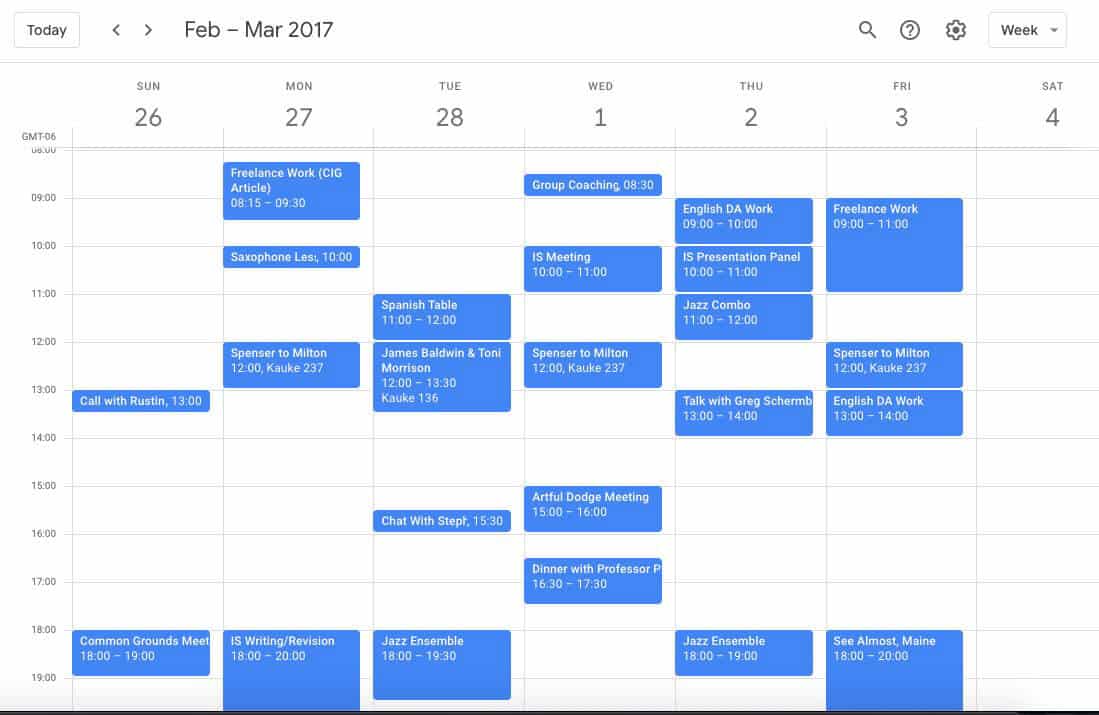
As you can see, I have all my classes blocked out. Not only did this make sure that I would never forget a class, but it also ensured that I would never schedule a meeting or other event during class time.
Note: If you’re using a digital calendar, I highly recommend you set your classes to repeat. This way, you’ll never forget when a class happens. Here’s how to create recurring events in Google Calendar.
You’ll also notice I have meetings, rehearsals, time for freelance work, and plenty of blank spots. I didn’t schedule my study time, as I was pretty good about getting that work done, but you could also include study blocks for particular classes if you want.
Of course, your calendar is just part of the equation.
How do you keep track of all the things you need to do on a daily basis?
How do you keep track of homework, tasks around your living space, and other goals you want to accomplish?
For this, you need a to-do list…
2. Your To-Do List/Task Manager
While having a calendar is the bare minimum for being organized, having a to-do list will really take things to the next level.
At first, you might wonder if a to-do list is even necessary at all. After all, can’t you just put all the things you have to do on your calendar?
While this method can work, it tends to fall apart if you have more than a couple things to do each day.
Plus, mixing your calendar and to-do list ignores the fact that each tool is better for different organizational tasks:
- Your calendar is for keeping track of events . That is, things that occur at a specific day and/or time that generally require you to physically be somewhere.
- Your to-do list, on the other hand, is for keeping track of tasks . Tasks are things you need to accomplish (sometimes on a specific day), but they generally don’t require you to be in a specific place or keep an appointment of some kind.
I realize the difference between events and tasks can sometimes be murky, so here are a few examples:
- A meeting with a professor
- A class you have to attend
- A music ensemble rehearsal
- Drafting an essay to bring to a meeting with a professor
- Completing a problem set for a class
- Learning how to play a piece of music for a rehearsal
How to Set Up a To-Do List
Now that you understand the difference, how do you actually set up a to-do list?
Again, you have a variety of options, and what you choose will depend if you want to use a digital or physical system.
On the digital side, we recommend Todoist . It’s free, intuitive, and easy to set up.
If you want a physical method, the bullet journal system is a great option. You can even create a hybrid digital-physical system, as Thomas discusses in this video:
But ultimately, it doesn’t matter what system you use. You could use a whiteboard or a blank notebook if you want. What matters is that you keep an updated list of the tasks you need to accomplish, as well as, you know, actually doing said tasks.
To make your to-do list, you should first create a brain dump of everything that you need to do on a regular basis. Here are some tasks that most college students need to do:
- Homework assignments
- Cleaning your dorm/apartment
- Preparing meals
- Club tasks (particularly if you’re an officer)
- Anything you’re learning outside of class
Next, you’ll need to put all of these tasks into your to-do list system. If you’re using a digital system, you can set certain tasks to recur (think “take out the trash” or “complete calculus problems for the day”). And then, as you think of new tasks, you can add them to your system.
Here’s an example of what my to-do list looked like in college:
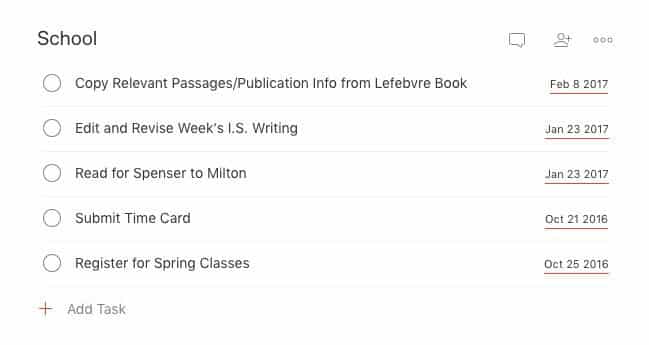
3. Your Notes
Taking good notes is key for comprehending and retaining any lectures or presentations that your professors give.
But taking notes on its own isn’t enough — to get the most value out of your notes, you need to keep them organized.
For some people, this could be as simple as having a different notebook for each class and referring back to it when you need to study for an exam.
While this can work, it’s not ideal. This is particularly true when you’re studying for a midterm or final and need to refer to weeks of notes.
To keep your notes extra organized, we recommend using a digital system such as Evernote . With Evernote, you can create a different digital “Notebook” for each class and type your notes there.
If you prefer to take notes by hand (which some studies indicate can help you better process information ), then you can also digitize your notes afterwards. To make this simple, just do it after all your classes are done for the day, before you start your homework.
When you use this system, you’ll be able to review material much more easily. You can even search for key terms and Evernote will help you find them in your notes, saving you the trouble of flipping back through a physical notebook.
4. Your Class Materials and Files (Digital and Physical)
In addition to your notes, each of your classes will likely have a syllabus, handouts, and presentations that you need to keep track of. You’ll also likely have assignments that the professor (or their grader) has returned to you, which can be valuable materials to review when you’re studying for an exam.
It’s key to keep all of these materials organized. Sure, you can probably get the syllabus, handouts, and PowerPoint presentations online. But that’s one extra step you have to go through when it comes time to study. Plus, you never know when the internet or school website might be down.
To be safe, I recommend you keep all of your class materials organized either in a physical three-ring binder or in some kind of digital system.
You could put all of the material in Evernote along with your notes, or you could have dedicated Google Drive folders for each class (other cloud sync apps like Dropbox and OneDrive work here as well, but Drive offers the best value for students unless you specifically need Microsoft Office).
Here’s an example of the Google Drive file system I used for my classes during the first semester of my junior year:
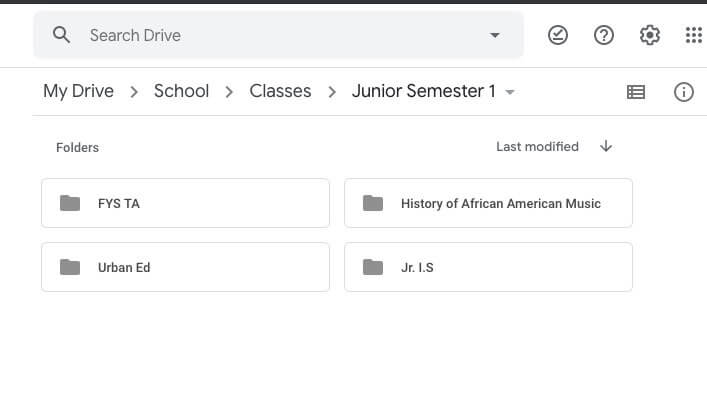
For extra redundancy, you could also keep folders on your computer with these materials in case the internet is down and you can’t access them.
Want more info on how to keep your files organized? Check out this guide Thomas created .
5. Your Backpack
We couldn’t talk about organization in college without discussing something that almost every student has: a backpack .
Even with an increasingly digital world, you still need to carry around your computer. And many classes will still have physical textbooks that you need to bring, as well as assignments that you have to complete on paper.
Your backpack (or briefcase or purse or whatever you use) is key for keeping all of these materials organized and at the ready.
Organizing your backpack isn’t hard — the key step is to remember to fill your backpack with the things you need for the day.
After all, there’s nothing worse than showing up in class, only to get that sinking feeling in your stomach as you realize that you don’t have the book or paper you need.
In some cases, not having the right materials could even hurt your participation grade, so organizing your backpack is something you must not overlook.
To make sure you bring everything to class, pack your bag the night before . This was the advice my mom gave me when I was in elementary school, and it still applied in college.
Packing the night before ensures that you don’t forget anything due to being in a hurry. And it also allows you a night of sleep to recall something you forgot.
If you’re really having trouble remembering to bring everything you need to class, you can add a task to your to-do list that says something like “Pack bag for [day of the week] classes.” Under this task, write a list of the things that you need to bring. This way, you can check off the items as you’re packing.
Here’s an example of what this would look like in Todoist:
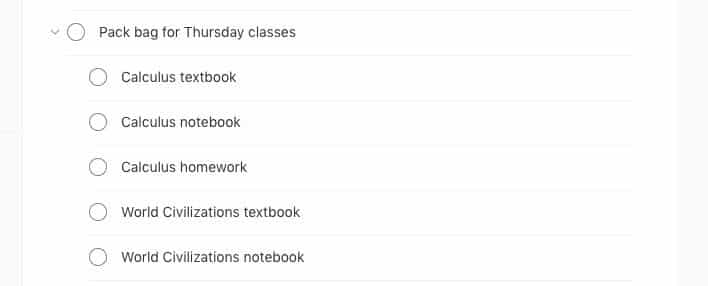
Curious what should be in your backpack for college? Check out this list .
How to Stay Organized with Weekly Productivity Planning and Reviews
If you went through all the steps in the previous section, you should now have a system for keeping all aspects of your life organized. However, creating the organizational system is actually the easy part.
The challenge comes from keeping things organized. So in this section, I’ll show you two crucial habits that will help you maintain your organizational system:
- Weekly planning
- Weekly review
These two habits are complementary, and they take 30 minutes a week at most. Yet they can have a massive effect on whether or not you actually stay organized:
1. Review Your Previous Week
So you put your organizational system into place, and you now feel more motivated than ever.
However, what you’ll quickly realize is that real life isn’t as neat and precise as your beautiful to-do list and calendar.
Inevitably, unexpected things will come up that will prevent you from completing certain tasks or even attending certain events.
It’s tempting to get frustrated when things don’t go as planned, but it’s more effective to accept that this will happen and correct your system accordingly.
One of the best ways for dealing with unexpected changes or challenges to your organization is to create a weekly productivity review habit.
This 3-step process only takes a few minutes:
1. Compare what you planned to accomplish with what you actually accomplished.
We start each week with the best intentions, but then life happens.
You planned to spend an hour each day practicing integral calculus, but you only did that 3 days out of the week.
You signed up for a Thursday evening yoga class, but then you ended up having too much homework to attend.
You get the idea. The point is to look at the gap between what you planned and what actually happened.
2. Use this information to make changes to your system.
Recognizing the gap between your plans and accomplishments means nothing if you don’t use that information to inform your future plans.
Once you’ve identified what you didn’t accomplish, you need to examine why. Then, you can adjust what you plan for the coming week.
For instance, if you didn’t get in your hour of integral calculus practice each day, what prevented you?
You might realize that it was because you were studying in the student center and kept getting distracted by friends passing by. Recognizing this, you could plan to do your studying in the library basement, a place with no distractions except some dusty geological survey maps.
As you make this process a habit , you’ll get better about planning realistic goals and schedules. Which brings us to the next habit…
2. Plan Your Upcoming Week
Once you’ve reviewed the previous week, it’s time to plan for the week to come.
If you’re adjusting what you do based on the previous week, then you’re already on the right track. But in addition to reviewing the previous week, I recommend the following weekly planning steps:
1. Clean up your task management system and calendar.
During the course of the week, there will be tasks on your to-do list that you either forget to check off or just don’t do. Your calendar may also end up with stray events that are no longer relevant, or with things that you need to reschedule for the coming week.
When you’re planning the week to come, first make sure to clean out all the existing junk in your organizational systems.
Find new, realistic due dates for tasks you didn’t get to last week, and make note of any rescheduled events on your calendar. This could also extend to organizing any binders you have for class, securing loose papers, and digitizing any notes you haven’t gotten around to.
2. Plan for the week to come.
Once you’ve cleaned out everything from the previous week, you can turn your attention to the upcoming week.
To start, make a list of any upcoming tasks you can think of. I recommend looking at the syllabus for each of your classes, as well as any online systems that your professors use to post assignments. Then, transfer your tasks into your to-do list system.
Next, take a look at your calendar. See what events are coming for the week, and add anything that isn’t currently on your calendar. Check your syllabus for impending due dates, and review your work schedule to make sure it’s accurate.
Finally, make sure that your backpack is organized and packed for the following day. This will help you avoid forgetting an assignment or book you need to bring to class.
This weekly review and planning process may sound time-consuming when you read through it, but in reality, it should take no more than thirty minutes.
And if you do it every week, you’ll find that it takes you less and less time as you become more organized . To make sure that you go through the process each week, block off time for it on your calendar (man that just got meta).
Staying Organized Sets You Up for Success
This ended up being a massive guide, so here are the key takeaways for easy reference:
- Use Google Calendar (or another calendar app) to keep your events organized.
- Organize your task with a to-do list system such as Todoist .
- Digitize your notes for easier review.
- Keep your physical and digital class materials organized using a three-ring binder and Google Drive .
- Keep your backpack clean and stocked with the materials you need to bring to class.
- Take 30 minutes each week to review the previous week and plan the week to come.
And above all, don’t let your organizational system get in the way of what really matters: accomplishing the things you want to do .
The right organizational system will help you do the things you want without getting too stressed. But at the end of the day, you still have to sit down and do the work.
So go out there this semester and do something epic!
Need help staying organized while taking online classes? Check out this guide .

14 Best Ways To Organize For College Classes
By: Author Kelly Clark
Posted on Last updated: March 12, 2024
Categories Career , College
It’s the start of a new school year! You may be attending college for the first time and are feeling a little overwhelmed by the newness that freshman year brings. Maybe this isn’t your first semester , but it’s your first time buckling down and deciding to be the best you can be this semester in your classes.
Regardless of where you stand, you’ll realize rather quickly how important staying organized in your college classes is to your college success. Time management is key in managing your school work, social life, and everything in between. Being a college student is definitely different than being a high school student!
If you are not sure where to start, I’m here to help. I’m sharing 14 of the best tips that will help you determine the best way to stay organized in your college classes.
Why You Should You Get Organized
If you are not a natural organized person, you may not realize the benefits of getting organized. It’s a refreshing feeling to know that you are on top of everything when it comes to all your classes.
Here are some of the benefits of getting organized:
- Increased productivity/time management
- Reduced stress levels
- No missed assignments or other important things and due dates
- More time spent with friends and doing other things you enjoy
All of these benefits make the college experience much more enjoyable. Next I’m sharing my top tips that will help you get your classes organized.
This post may contain commissionable links. Thank you for supporting this resource.
14 Best Ways To Organize For Your College Classes
While at first glance some of these tips aren’t about organization for your college classes; staying organized in multiple areas of your academic life will help navigating classes, and much easier.
Use a white board calendar
This is a great way to see the monthly view of what is coming up. It doubles as a decoration and a needed organization tool. I really like the ones that have a cork board as well. I use that section to put any encouraging notes from friends or sticky notes with things I need to remember.
On the dry erase board you can put pretty much anything you want on it. Whether you just want it to be used for classes, or you want to make it a more general calendar.
One thing that I would recommend is to use color to distinguish between things like your academic life or university life and other tasks/events. This can look like separating your classes into different colors, or even separating academics and social events /commitments into two different colors.
Use a digital calendar and a physical planner
Two planners may seem excessive, but hear me out. What if there is a day that you left your paper planner in your dorm room on a day where you have a full class load. Having a digital calendar/planner helps in these situations.
Now if any of your professors announces any test dates or important dates for a project, you’ll have a dedicated space to put it. I would recommend reviewing both your digital calendar and physical planner at the end of each day to make sure they are both updated. It may be helpful to set an alarm on your phone.
Keep all of your notebooks separate
I know it may seem simpler to just buy one notebook and separate your classes throughout it, but it’s actually the opposite.
Doing it this way makes it easier to get classes and homework assignments mixed up. It’s a much better use of your time, and mind, to have a separate notebook for each class. It also helps in the long run because you won’t have to worry about running out of space and into another class’s section of the notebook..
Digitize your notes
It has been proven that writing down your notes helps with memorization. For this reason I believe it is best practice to hand write your notes, especially if you have different color pens.
The disadvantage of this is that it can be easy to forget your notes when you need it, or even easy to lose them. For this reason I recommend taking the time to digitize your notes. You can do this in different ways. Just find the one that works the best for you.
Keep your dorm room organized
This may seem unrelated to your classes, but it actually has everything to do with them. When your space isn’t organized the disorganization can seep into other areas.
Having a clean space makes it easier to locate your books and other course materials you may need for class or homework. This is essential on those days where you are running behind and need to find something at the last minute.
Pack your bag the night before
Along with keeping your room organized, packing your backpack the night before comes in handy on those late mornings and busy schedule.
At night when you are in study mode your mind is more focused and clear. This is a great time to get ready for the next day. Figure out what classes you are going to and what you’ll need for them, then simply pack your bag.
Use separate profiles on Google Chrome
This tip is also a great productivity hack. By using a profile for school and a profile for free time/other areas of your life it keeps both your digital space and your mental space organized.
By having a specific place for school work/study time you get into that focus mindset and are less likely to give into distractions. You can also put website blockers on distractions like social media and streaming sites.

Organize your to-do list by class
This is helpful for determining which assignments and exams are the most important for that day/week. If it’s Tuesday afternoon you’ll want to pay more attention to your Monday/Wednesday/Friday classes than your Tuesday/Thursday classes.
Creating to-do lists based on your classes will help you determine where to start.
Color code your notes
Color coding your class notes isn’t just aesthetically pleasing, it’s an effective way to stay organized in your classes.
There are various benefits to color coding your notes. One of the more obvious reasons is being able to locate something in your notes quickly. This saves time while you are studying for exams.
Block off study days for exam prep
As you have most likely found out, you find out when exams are at the beginning of the semester with all of your class syllabi. It’s a good idea to go ahead and mark the days before your exam for study time and exam prep.
This way you won’t get caught off guard when the exams come up. You’ll know not to schedule anything else on these days ahead of time.

Organize Your Digital Work Area
Much like having your physical space organized helps you with your classes, so does your digital space.
This book has great tips about digital organization. I recommend going through key things like your bookmarks, files, Google Drive, and downloads on a regular basis to stay organized and prepared for when you need to be on your computer.
Determine A Productivity System That Works For You
There are a plethora of productivity systems and tools that you can use to help with assignments and studying. The key is determining which one(s) works best for you.
Some examples of these productivity tools are the Eisenhower Matrix , Eat The Frog, and Time Blocking. Once you’ve determined the one that works best you’ll be able to streamline your time studying and getting assignments done.
Get Some Sleep
An organized mind is a rested mind. Sleep is vital for staying organized and focused in your college classes. College may be known for all nighters, but that doesn’t mean it has to be.
It’s recommended that college students get at least seven to nine hours of sleep each night. This will help you stay alert when it comes to college classes, studying, and more.
Determine A Weekly Set Up Day
There is a lot that goes into having a successful academic week. I recommend having one day of the week, I usually pick Sunday, to review the upcoming weekly assignments, events, and more that will be happening.
This will help you go into the new week with confidence and expectation of how the week will go.

In Summary: What is the best way to organize for your college classes?
I hope that these important tips help you feel confident and ready to take on the new school year! The best way to organize for college classes is the most effective way what works for you. Try out these different methods in combination with each other until you find your flow.
When you start the semester all organized for your classes you are giving yourself the best chance of academic success throughout the year up until the end of the semester.
Are there any tips I missed? How do you get organized for college classes?
More Resourceful College Posts:
- 20 Comfortable College Dorm Ideas for Guys
- 9 Most Affordable Clothing Stores For College Students
- The Best College Classes You Should Choose To Take
- 10 Stand-Out Tips for Emailing Your College Professor
- 50+ Creative Art Project Ideas For College Students
- 7 Things That You Can Try At A College Party
- 70 Hard Words to Spell for College Students
- 20 Effective, Good Study Habits For College Students To Develop
- The Ultimate College Bucket List – What To Do Before You Graduate
- 40 Activities To Put On Your Activities Resume For College
- 100 College Graduation Cap Ideas
- 100 Epic College Event Ideas for Students on Campus
- How to Throw a College Dorm Party
- The Best Router For a College Apartment and Dorm
- 75 Must-Try Virtual Event Ideas For College Students
- 75 Sorority Event Ideas For Sisterhood Activities
About the Author

Kelly graduated from Liberty University with a degree in Advertising and Public Relations and a minor in Journalism. Even though it took her a little while to find her career path, she was always meant to be in Communications. She remembers writing poems and songs when she was a little girl and pitching to my parents the reasons why I should have a cell phone when I was a teenager. She currently has a blog (budding-joy.com) where she talks about her weight-loss journey, mental health and personal development. Her hope is to encourage and inspire readers and let them know they are not alone. Reading blog posts like that are what helped her in tough times and she wants to pay it forward. She loves dance fitness, listening to music, and creating layouts in her bullet journal. She's a big fan of planning, especially when cute notebooks and pens are involved. Her dream job has changed so much over the years; right now she'd love to co-own a dance studio.
Website: budding-joy.com
Notify me of follow-up comments by email.
Notify me of new posts by email.

Tips for Online Students , Tips for Students
How to be Organized in College: Your Guide to Success
Updated: July 25, 2022
Published: June 25, 2019

There are many ways for how to be organized in college, and all of these pro tips will help you to be successful during your college journey and assist in avoiding burnout.
When you are in college, a lot of your life’s daily activities are going to change. Not only will you possibly be living away from home for the first time, but you will also be spending a lot of your time learning coursework, studying, researching, reading and writing papers. When it comes to managing everything with school, as well as balancing your social life and physical and emotional health, it truly pays to stay organized. Here are a few good tips on how to be organized in college so that you can better manage your time, space and activities.

Source: Unsplash
Top 8 ways to be organized in college, 1. use a planner.
Because you’ll be running from class to class and scheduling time to hang out with friends, it is very helpful to use a planner or a free tool like Google Calendar . With a tool that can remind you of upcoming events, you can schedule in your tests and deadlines so that you never forget or miss something important.
Additionally, if you attend online university, this means that your schedule is more flexible as there are no set class times. For example, if you go to an institution like University of the People, you get to essentially choose when you go to school . While this places more responsibility on the student to make time for education, it also means you can set up your schedule and map out your calendar how you see fit. Perhaps you focus better in the mornings, which means you can set aside that time for classes and evenings for your free time.
This all goes hand-in-hand with also making sure your class schedule is visible. Either print it out or create your own digital version so that you don’t forget where you have to be at a certain time. It’s a good first step to learn how to organize yourself as a student.
2. Use Color Coding
Color coding your schedule and tasks is a simple and easy-to-read way to know what kind of tasks you have coming up. To exemplify, you can color code your calendar by giving tests, homework, tasks and free time each a different color so that you can simply glance over at the calendar to see what you need to do.
3. Keep Your Desk Clean
Whether you attend online school or a traditional university, you will have a workspace. This could be in your dorm, at a coffee shop, in your living room, or wherever else you may choose for it to be. No matter where you decide to get your work done, you’ll want to keep it clean and clutter-free. Try to keep only the things you need on the desk when you are working, which may mean you’ll have a computer, notebook, pen, and water, for example. By maintaining a clutter-free space, your mind can stay more focused and feel less stressed by all the mess.
4. To-Do Lists
While there are many ways to create a to-do list, a good tip is to organize your tasks in list of priority based on deadlines. Additionally, if there are tasks you can get done quickly, you may want to get them out of the way so that you can immediately shorten your list and feel less overwhelmed.
Another type of to-do list that is very helpful, especially when you are studying, is called a “distraction to-do list.” When you are focused on a task and something irrelevant comes to mind, instead of switching tasks, simply write it down and check it out when you take a study break .
5. Organize Your Computer
Your computer is your digital notebook. It saves time and makes it very helpful in the future when you need to reference back to material if you keep the folders on your computer organized from the get go. Try to start with a basic organization structure. Maybe something like this could work for you: create a folder for the school year, then the semester system, then a folder for each class name. Inside the folder for each class, you can set folders for “essays,” “homework,” “resources,” etc.
Also, be sure to backup your computer consistently with an external hard-drive or use a cloud software like Amazon Cloud Drive or Google Drive . It would be a disaster to lose all your hard-earned work in the blink of an eye, so be sure to take the few minutes of extra time and create your backups!
6. Effective Time Management
When it comes to school, one of the most important tools you can leverage is effective time management . Time management allows you to optimize how and where you spend your minutes to reap the most rewards.
Especially if you are studying online, you will have to manage your own time because you set your school schedule. Some tips for time management include: waking up early, scheduling your to-do list, breaking up big tasks, giving yourself rewards, eliminating distractions, and focusing on one task at a time.

7. Take Care of Your Health
Your most important asset in life is your health. Your health encompasses your mental, physical and emotional state of wellbeing. It’s easy to feel stressed in college, but by setting aside time for social activities, exercise and relaxation, you can calm the effects .
Be sure that you allow yourself time to de-stress and partake in activities you enjoy doing, which could include: running, yoga, reading, writing, singing, dancing, or creating art. Whatever you enjoy to do, give yourself the time necessary because you’ll need it to recharge and avoid burn-out. At the same time, make sure you receive an adequate amount of sleep , which is recommended to be 7-9 hours, so that your cells can recharge and your brain can absorb the information you spend your days learning.
8. Financial Health
College is undoubtedly expensive. While there are alternatives like attending a tuition-free institution like University of the People, you’ll still want to make sure you are managing your finances so that you can avoid going deeply into debt and spending energy worrying about money. To help do so, outline the costs you need to cover each year for school and your sources of income. Sources of income can include: salaries and tips and financial aid like scholarships, grants, and loans.
If you choose to attend University of the People and take the tuition-free route, you still have the opportunity to attain scholarships to help cover the costs of the course assessment fees.
The Bottom Line
Staying organized in college will help you to be successful. Because there is going to be a lot to balance on your plate, you can create systems that work in your favor to manage your time and tasks effectively.
Of course, you won’t be 100% organized all of the time, but when you practice some of these tips on how to stay organized in college, every bit will count to create good habits and make your college experience more enjoyable.
Related Articles

Sara Laughed
Creative living & authentic faith
45 Tips for Staying Organized in College

I love being in college. And, though my room may not always show it, I also love being organized and productive. One of my most popular posts on this blog is my Ultimate Guide to College Organization , and since it’s been read and shared so many times, I thought I’d make an updated, expanded guide on staying organized in college. Here are my top 45 tips for staying organized in college !
It may seem like a lot, but you definitely don’t need to implement all these tips. Just read them over and see which ones fit you and your lifestyle. Above all, remember that caring for yourself is the most important. Having an organized life on the outside means nothing if you are not happy with yourself and your life.
The Right Attitude for Staying Organized in College
Check out: the ultimate guide to college motivation to stay motivated.
1. Be motivated. I can’t stress enough how important it is that you are motivated to tackle the mess in your life. Otherwise, when the going gets tough, you will get sloppy. My advice is to make a list – yes, with real pen and paper – of why you want a clean, organized, and manageable life. Tack it up somewhere where you will see it when you start to feel unmotivated.
Using Planning to Stay Organized in College
2. Keep a planner, or a planner app . During the school year, I use my planner religiously to track my classes, assignments, and social plans. My favorite planner for college students is the Panda Planner , which is great for boosting both productivity and a positive outlook on life. It helps me stay focused and optimistic! You can check out the planner here .
3. Use only one planner. Just as important as using a planner is only keeping one. If you have both a paper planner and an app, or multiple planners, the odds are that something will eventually slip between the cracks when you forget to write down your plans in both. Also, having more than one will take up a lot of your time.
Check out: The Ultimate Guide to College Organization for how I use my planner
4. Keep it with you. During the school year, I always have my planner on-hand. That way, if I get a new assignment, make plans with friends, or have to schedule a doctor’s appointment, I can write it down immediately before I forget.
5. Stick to your plans. Have a rule: if you write it down, get it done. That way, your planner is more than a helpful reminder of what you could have accomplished today: it’s an actual guide to what you will be doing.
6. Plan at the beginning of every week or month. At the beginning of every new week, sit down and write in your activities, classes, and any reminders ( call Mom! ) for the coming days. I don’t have the time to do this all at once at the beginning of my semester, so doing it on a weekly basis works for me.
7. Use the days-before-it’s-due system. I learned this trick over at Organize My College Life . In your planner, use red pen to mark the day an assignment is due. Write it out in blue pen in the two days ahead; black for three to five days ahead; and green for six to nine days ahead. That way, you will always see assignments coming up on the horizon, and won’t ever be surprised by an essay that’s due tomorrow.
8. Schedule chores . Doing laundry, taking out the trash, you name it. Planning to do this every Sunday will keep your laundry from piling up on the floor, or your bin from overflowing.
Syllabus Tips for Staying Organized in College
9. Save all your syllabi. This is so important. If your professor gives you a guide to what your entire semester is going to look like, don’t lose it.
10. Annotate your syllabi. Mark your syllabus with everything you need to remember. I have a guide to this in my Ultimate Guide to College Organization , so to learn how, click here !
11. Make an assignment list . When I was taking five classes, keeping an assignment list saved my tail quite a few times. Gather all your syllabi together and make one long sheet of every day that an assignment is due. You can see how I do it here , or learn Organized Charm’s great method over at her blog .
Using Daily Tasks to Stay Organized in College
12. Keep to-do lists. I keep a to do list every day. Do it in your planner, on your phone, or over email – the point is, it will help you stay on-track. The Panda Planner has some great to do list features in its daily view.
13. Wake up at the same time every day. Whether you’re a morning glory or a late riser, pick a time to wake up every day and stick to it. Often I find that when I oversleep, I feel that my morning has been “wasted” and I don’t do much work. Waking up at the same time every day will help you avoid this and get into a set schedule.
14. Make your bed when you get up. Making your bed will keep your room clean, and will keep you from crawling back in if you’re sleepy.
15. Have a consistent schedule. Try to keep a daily or weekly schedule that you’ll stick to. I find that I’m a lot less productive when my schedule is all over the place.
16. Figure out your most productive time. Figure out what time of the day you are the most productive. For some people, it’s in the early morning before breakfast; for others, mid-afternoon, or late at night. Find when you get the most work done and try to optimize that time for productivity and work.
17. Stock your backpack. I have a friend who spends 15 minutes a day filling their backpack with what they need to work that day. I find that a great time-saver is to have my backpack always stocked with pens, my planner, and a water bottle. In the mornings, you can slip in your laptop and a notebook and you’re ready to go!
18. Plan your outfit ahead of time . I used to spend forever in the mornings picking my outfit. Now I go to bed with a vague idea of what I’ll wear the next day. It helps me save time in the mornings to know what I want.
19. Clean-desk policy. I admit that I consistently fail at this, but I know that my boyfriend finds it very useful. At the end of every night, try to have a clear desk, with just your computer, lamp, or books on it, and no clutter. It will keep your room tidy and make it easier to find what you need in the morning.
Check out: My College Room Tour to see how I organize my desk
20. Clean-floor policy. Ditto with the floor. Again, this is a weak spot for me, but I try not to have any clutter on my floor during the week so that it is easier to get and find what I need.
21. Spend 5 minutes a day cleaning. Seriously, you will be amazed at what you can do in five minutes a day. When I’m having a hard time staying motivated to keep organized, these few minutes at a time save me from total chaos.
Work Tips for Staying Organized in College
22. Have a system for taking notes . It doesn’t matter what kind you use – Cornell notes, color-coded scribbles, or Word Notebook – just make sure that you have a system and stick to it. It will make it easier to review notes later on.
23. Don’t question and don’t stop yourself while writing. This is how I get my essays done so quickly – don’t worry too much about the quality of your writing while you’re at work. I find that I can hold myself back endlessly by worrying about a single word or sentence. Instead, let go of your inhibitions and don’t be afraid to write a terrible first draft. You can always edit later.
24. Use a timer. Work in bursts of time. Some people swear by 25 minutes; I prefer to work for an hour at a time, and then take a longer break. Either way, using a timer will keep you accountable and prevent you from wandering over to Facebook or Pinterest while you should be working.
25. Work and play in different areas. I heard the following from a nurse: bed should be for the three S’s: sleep, sickness, and sex – not work. Work at a desk or in a library, and reserve your room or bed for hanging out and sleep.
26. Use the 8/8/8 method for balancing your life. I heard this tip from the same nurse. It’s a way to divide your time to be responsible and still relax. Try to sleep for eight hours a day, spend eight working, and eight hours for the rest of your life – time with friends, eating, etc.
27. Set your own deadlines. This has saved me countless times when it comes to writing essays. If you have two essays due on the same day, vow to finish one of them on a different date; for example, a week or three days before it’s due. This will mean that you have to get started earlier, but it also means you will not have to scramble to finish all your work at the same time when your actual due dates come around.
Digital Organization for Staying Organized in College
28. Make yourself a schedule . Making yourself a schedule, even by using Google Calendar and screenshotting it, can be really useful. You get to have a copy of your permanent schedule on hand.
29. Set up email filters . I use Gmail, and I find email filters and tags a great way to organize my emails so that they stay organized without too much work. I use one tab for personal and one for academic, with different tags for different activities and classes. It helps make my inbox feel more manageable.
30. Use SelfControl , or actual self-control, to limit time spent on websites. This app keeps you from accessing websites like Facebook, Tumblr, or Twitter when you should be working. It is free and highly customizable – you can block any website you like.
31. Back up your computer using a hard drive. That way, if it crashes, you won’t lose all your hard work.
32. Disconnect from the internet for a few hours a day . Unplugging is a healthy way to curb stress and keep yourself from wasting too much time on the internet.
Supplies for Staying Organized in College
Check out: the ultimate guide to college organization.
33. Give each class a color . Each of my classes gets a distinct and separate color like blue, red, or green. I then match all my binders and notebooks for that class to that color, so that they are easier to find and grab when I am on the go.
34. Keep binders, folders, and/or notebooks for each of your classes . Everyone is different, but I find binders the easiest for most of my classes. Find out which one(s) work best for you and then do your best to keep them organized.
35. Have system for organizing your binders. I love this one by the Holladay Life.
Tips for Keeping Your Room and Desk Organized in College
36. “If you take it out, put it back” rule. This is the easiest way to keep a desk clear.
37. Toss duplicates. You don’t need two staplers, or three rolls of tape. Give one away put it in storage for when your first one breaks or runs out.
38. Keep any “might needs” in your desk drawer, rather than on your desktop. Keep staplers, hole-punchers, etc., in your drawers rather than on the top of your desk. This will help keep your desk neat and organized.
39. Label loose cords. Use masking tape to label your cords with words like “camera,” “iPhone,” etc. This will help you identify them after you forget what they’re for.
40. Label your chargers ends with the same washi tape . I saw this tip on Pinterest and loved it. Using the same washi tape on your cord ends will help you know what to unplug when you’re in a rush. Bonus: it helps when untangling, too!
41.Use a binder clip at the edge of your desk to store your charger ends. I learned this trick over at Instructables and I’ve found it really helpful for not losing my cord ends.
42. Keep a white board with reminders to yourself. I love using my whiteboard as a place for reminders and notes to myself. You can find them pretty inexpensively at your local supply store, or even CVS.
Self-Care Tips for Staying Organized in College
43. Sleep enough. I can’t emphasize this enough. Sleep is so important! Try to get between seven and nine hours of sleep a day, depending on your age and preferences, which will help you stay alert and happy during the day.
44. Meditation/yoga/mindfulness/prayer. Find something that makes you feel connected to yourself or your spirituality. Mental health is so incredibly important, not just for being organized, but for being a balanced and happy person. Take care of yourself!
45. Go easy on yourself . No one is perfect, and it can be incredibly difficult to stay on top of everything in your life. Do your best, but remember if you mess up that it is okay to make mistakes. All that matters is that you are trying.
Hey hey! I'm Sara, an American writer living in the Netherlands and working as a product manager.
Loved this post! There was some really good advice. I’m terribly messy so I loved the “take five minutes a day” tip for cleaning. (:
Thanks so much, Nicole!
These are great tips! I’m in college too, and having an up to date planner and referring to my syllabus is absolutely critical!
Thanks Rebecca! I know, some people think it’s over-the-top, but I find it so useful!
Oh, YAY! This is so fantastic, Sara! Thank you for including Organized Charm! I am still really, really working on streamlining my life down to one (or at least two) planners! The obsessive-ness is just too powerful! Haha.
Thank *you*, Kristen, for sharing your great organizational methods online!
Fantastic list! I must say, several of them will work even for me – who is gratefully out of college! This might be odd though, I miss not needing a planner, loved that thing!
Thank you! I am sure I’ll find an excuse to keep a planner even after I’m out of school, haha!
This is great! I will be sure to share with any readers or friends of mine who are starting college this year! Great read!
Thanks so much, Kristen!
This is a great post. I just graduated college, but so many of these things apply in just plain life too! thanks for sharing! stopping by from the Peony Project, by the way 🙂
Thanks so much for stopping by! I’m glad you found them helpful!
Oh my goodness! I absolutely LOVE this post! Everything you said is spot on! Setting up email filters in Gmail is so helpful. Pinning this to my college board! Found you via the Peony Project 🙂
Oh yay! Thank you so much, Brittany! And yes, Gmail filters can be a life-saver!
Loving tip #7, I never heard of it before! I’ll definitely be trying that out. #23 is the most difficult for me, but I’ll give that a shot too 🙂 Thanks for these tips! -Audrey | Brunch at Audrey’s
I love the 8/8/8 rule. I’ve never herd of it but I will use it, it makes me feel like I have more time and I still get 8 hours sleep.
http://www.collegeruled.com is no longer a valid website — as amazing as it was.
Thanks for letting me know! I will update the post.
I am a multi-planner user. I saw what you were saying happening and so I reduced them. My question is, what would you say about having two different planners for two different purposes? I have a paper planner that I use for school (assignments, tests, class schedules, etc.) and I use Google Calendar for mostly personal reminders (like a meeting I want to got to, appointments, yoga, etc.). Do you think I should try to get rid of one or do you think this is manageable? And what if I have an Assignment List, too? I’m a freshman, so I’m still trying to get into the routine of college. Thoughts? Thank you! Also, I think CollegeRuled is for sale, so the link didn’t work.
I think using multiple planners is fine if they have different purposes! Updates and notifications for things can be really helpful. I think having an assignment list in addition is fine – I use both a planner and a list! Good luck with getting organized!
Hey, LavenderElephantGirl. I just wanted to say that I do the exact same thing as you (paper planner for school, Google Calendar for appointments), and I find it extremely manageable. It’s easier to edit the Google Calendar since appointments and meetings change so much from week to week. I’m a college Junior, and I’ve found it very helpful 🙂 Good luck!
I could currently cannot use the 8/8/8 method, sadly. 7 hours of school everyday, and about five hours of homework afterwards…
Amber, I’ve been there. My high school was like that. You will get through and be stronger for it!
TY to much for this Good guide … I use every step of this guide .. from a C student to A student … this guide will not take any effect only if u want to …. 🙂
Loved this post! So helpful & motivational!
These tips helped me out more than I thought. I only have one more year and I’m done! The only thing I wish I knew was how to organize my things. I found some pretty useful videos that will help me at least in my last year.
http://www.bedbathandbeyond.tv/Home-Featured/6667595– http://www.bedbathandbeyond.tv/Home-Bedroom/College-Organizing-Hacks/6667597–66208190
This is an AWESOME resource, Sara! Thank you so much for posting it (and including Organized Charm)! 🙂
Thank you Sara, I’m concern with my two boys going off to college and I’m trying to find a way to keep them organize. They play sports and I know it can be challenging to juggle, class work, sports, & daily living. I’ll use your tips to help them as much as I can. Thanks again.
Hey Wally! Time management can certainly be tough. I hope you’ll find the resources on my site helpful, and you’re also more than welcome to check out my college resource site, College Compass, which has a lot of posts that may help you under the “college help” section. http://collegecompass.co/
much love from me to this blog post! helped me a lot! xx
It’s wonderful to hear that it helped you, Ashley!
wow this really help me with my paper sara thx a lot
I love this site. I have 2 planners and a bullet journal.
Planner #1 is all family appointments, birthdays, social obligations and so forth! (Only school things that go in there are big projects, quizzes, exams, and finals)
Planner #2 is all school purposes. The month at a glance is all exams, finals, big projects and quizzes. The weekly goes more into detail.
Planner #3 is my fault bullet journal. I use this one the most. I plan out my day from wake up to bed. 30 minutes before bed I plan my next day!
These are great tips, Sara! I LOVE the clean floor policy! I’ve never heard of that before, but it seems super useful! I also love the 8/8/8 rule… that’s a great reminder for those of us who tend to struggle with work/life balance 🙂
Thank you for this . My daughter struggled this past year (first year of college) due to her ADHD and Executive Dysfunction. She was dismissed from her college but is intent on getting her grades up at Community College so that she can re-apply soon. I have tried to help her to organize herself but the motivation has not always been there on top of the above. I think the motivation is there now and your website will be easier than me just giving her ideas! I’ll let you know how it goes later this year!
I cannot express how many tips and tricks I got through this– even when I was only into the first few. The 8-8-8 rule is something I’m going to keep posted in my dorm room for now. It can be extremely difficult to keep track of the “t word” (time) in college and it is so easy to get overwhelmed, very quickly. I have a running list of the organizational tips you listed especially. I appreciate you ending the article with #45 “go easy on yourself”, especially when it comes to being somewhat perfectionist like myself. Getting better at a routine is my main goal for this semester now. Such a helpful post!
Notice that the 8/8/8 rule includes 8 hours of actual work…that doesn’t count time between classes unless you are working on class…also doesn’t count lunch or other breaks. While in college it might be better to have a 8/10/6 rule 8 hours of sleep, 10 hours of class/ studying, and 6 hours for everything else. It will better prepare you for real life if you plan to have both a high-intensity job and also care for a home and family!
This list is amazingly useful, thanks for your insight. You also sound like a beautiful person with your head in the right place and I wish you luck in the world! (:
hi there sara ! thank you soo much for youre useful tips.i really enjoyed it and i have found alots of great ideas for my college life. tanks again
I’m in 10th grade and still found these tips really helpful … Thanks!!!
Thanks Sarah for your post. I work a full time job, am a mother of 4, and in my second years in a master’s program, all your tips are amazing !!! I will definitely put some of this tips to use ASAP!! 🙂 Brenda C.
I’m also a full-time working mom along with my college studies. These tips have really heen a life saver for me.
I love how extensive this list is! Thanks so much for writing this. I have a full load plus extracurriculars plus I’m trying to get back into my workout schedule plus I’m trying to transition to veganism or a plant-based diet. My daily life is pretty hectic and I haven’t had much work-life balance. I created a planner because I knew what was coming for me, but I feel like I’m falling behind now. So yea this was great motivation. Thanks!
Love this, thanks so much, I’m starting grad school in this fall. Been out for 6 years this post was just what I need.. excited but anxious
Hey Amber! Thanks so much for taking the time to comment. I wish you nothing but the best — keep your chin up and work hard, and you will succeed!
I am not in college yet. I am actually a junior in high school. I started searching for help because my entire high school career I have encountered the same issue. Towards the end of every quarter I find I’ve let my assignments pile up and left absolutely no time to complete all of them. I usually manage to maintain A’s and B’s despite this. This year, however, I signed up for a class at the local college to complete an extra credit. The class was a digital media and design course that ended up being very work intensive, more than other college courses I have signed up for, and I fell behind in regular school as well as the class. Now it looks like I will have to withdraw from the class. My parents are very upset as this sort of situation has happened before, and I had acted as if nothing was wrong for a while when I should have been asking for help. If you have any advice for me to keep on top of my assignments that would be ideal. I use a planner but struggle to stay motivated while working and nothing seems to be working for me anymore. I have gotten in the habit of putting things off for the past few years. I know I can’t go into college with these habits and expect a positive outcome. I am totally lost as to what to do from here.
Really nice. Thanks a lot
These are great tips! I’m in college too, and having an up to date planner and referring to my syllabus is absolutely critical! Have a great day!
Thank you! I’m 29 and returning to college and taking SIX classes! More than I ever took when I was younger so i’m looking for new ways to stay organized. Lots of good ideas!
Thank you for commenting, Cate! I wish you lots of success in your journey back to school!
Thank you for your great tips. Goodluck for your life 🙂
Hie sara sister, Am Dorai Raj from India i just got inspired by your tips and would choose the planner tip and the go easy on your self tip to make my self better and also sis please give me some tip to stop addiction from distracting i means i always get distracted from some or the other way while am om some work which i do, Once again thanks for such a valuable tips.
I love to read your blog,,and i learned a lot from it, thank you for this useful tips,, Godbless😇😇😇
Still helpful in 2019.
IAM amazed I was really looking for these tips
Let me share you my current situation…🙄 Firstly,IAM freaked out that my college is starting up again and IAM freaking out just because I got very less grades in my finals..😣 and Iwas looking for tips for studying and getting organized 😑 but then when I got mail about *BEST TIPS FOR COLLEGE*.and then I saw your blog and went through your tips and I will try to get myself back..😅 and
A BIG THANK YOU TO YOU 🤗🤗😘😘
I WILL GET BACK TO YOU AFTER I TRY THESE TIPS AND IAM SURE THAT MY GRADES AND MY LIVING STYLE WOULD CHANGE A BIT😉 THANKS ONCE AGAIN
I’m gathering tips for my granddaughter. Although she is only going into eighth grade this year I truly believe she will benefit from these tips now. Thank you kindly for all your time and effort!
This has so many useful tips! Thank you!
Good tips. I love it.
A great advice that will surely beneficial for me …. Tq for these advices…
This was great thank you so much! Looking forward to trying all these helpful tips out.
Thank you! I really enjoyed your tips.
I love your article……thanks soo much. I’ll start working on it ASAP😘😋
Thank you so much !! Really learned a lot on how to get prepared. 😍
Leave a Reply Cancel reply
Your email address will not be published. Required fields are marked *
Post Comment
Related Posts

Decorating the world

Practical Tips for Your Trip to the Netherlands

Behind the Little Lantern Shop
Begin typing your search above and press return to search. Press Esc to cancel.
- (800) 596-0724
- Request Info
Sophia Sikowski

Empowering Parents: How to Avoid Burnout While Pursuing Education

What is Nurse Practitioner Credentialing?

Herzing's Career Pathways to Women's Health Nursing

The Evolution of Nursing: From Past to Future
- Scholarships
- Nursing Programs
- Campus Locations
Contact us to request more information
Opt-In to Receive SMS Messages
Get the latest news you need to know, from study hacks to interview tips to career advancement. Have it delivered right to your inbox biweekly.
Life in Twentys
Getting Through College and surviving Adulthood
All Posts , All Things College , Planners & Printables · 8:15 PM
College Binder Organization 101: How to Setup & keep it together!
When I first started college, I was totally overwhelmed. Not only did I have to learn a whole new academic system, but also figure out a way to keep track of all my assignments, lecture notes and exam materials.
That’s when I stumbled upon college binders – and they’ve been a total lifesaver ever since!
My binder setup was super efficient and cute *in a nerdy kind of way*. I opted for a large, durable 3-ring binder with a zipper closure. It had several mini dividers, lots of extra interior pockets, and tabs to keep everything organized.
I went all out with the fun stuff too (because who doesn’t love school supplies ?) — binder clips to keep important documents from slipping out, a hole punch & label maker, washi tapes for decoration and a personalized touch, and stickers because everyone loves stickers.
I hole-punched all of my notes, worksheets and handouts so they could be stored neatly in the binder. And then I used page protectors to keep my notes, important documents and drawings in pristine condition, while I also included clear plastic pockets to store flashcards, loose papers, pens, and other small items.
Related: How to stay Organized in College: 9 Tips to Help You Conquer the Chaos
Each section of notes was labeled and organized according to subject, so it was easy to find what I needed when studying. The front cover was my masterpiece: I printed out a picture of my favorite meme and pasted it on for an extra fun touch.
The most satisfying part of setting up my binder? Securing all of the documents with the binder rings. After hours of hole-punching and labeling, I could finally feel proud of the my super-organized binder. It was a true sense of accomplishment!
What are the benefits of using College Binders for students?
Well, for starters, they help you stay organized. With all of your notes and assignments neatly tucked away in one place, it’s easy to find what you need when studying for exams or writing papers.
Plus, you can easily take your binders with you when you go to the library or meet up with a study group. It’s like having your own personal filing cabinet right in your backpack!
And if you’re feeling a bit fancy, there are plenty of fun and colorful binders to choose from, so you can make your organizational system as stylish as you want.
All in all, college binders can be a great tool when it comes to staying on top of your studies. So if you’re looking for a way to keep your class materials in check, give them a try!
Related: College Student Backpack Edition: What You Need & What You Don’t
Is it better to have Binders or Notebooks in College?
When it comes to college, the age-old question remains: binders or notebooks? Both have pros and cons but there’s no right answer. Ultimately, it comes down to personal preference.
Let’s start with binders. If you’re the type of person that likes to stay organized, binders are a great choice. You can easily organize your content by tabs and keep all of your classes separate. Plus, they’re usually more durable than notebooks, making them a great investment.
On the other hand, notebooks are your classic go-to for college students. They tend to be cheaper than binders and are more light in weight, making them easy to carry around with you all day. Not to mention, you can totally customize your notebook with cool stickers, drawings and more!
At the end of the day, it’s really up to you to decide what works best for you and your classes. While binders might be a great option for some, notebooks may work better for others.
Related: Getting The Most Out of Class: The Best Note-Taking Tips for College Students
How to choose the perfect binder?
When it comes to college binders, there are so many options ( different sizes, different colors ) that it can be hard to figure out which one is right for you.
But don’t worry–I’ve got you covered! Here are some tips to help you pick the perfect binder for your needs.
1. The first thing to consider is the right-size!
Are you going to be carrying around a lot of assignments and notes? If so, then a larger binder with several pockets inside would be ideal.
This way you can easily store all of your materials in one place. On the other hand, if you don’t have as much to carry around, then a smaller binder would be better suited for you.
2. Next, think about the type of binder you need.
Are you looking for something that is durable and waterproof?
If so, then a hard-shell binder is exactly what you’re looking for. These are great for protecting your documents and notes in wet weather or any other situation where they may be exposed to moisture.
3. Finally, think about the design and color of the binder you’d like.
While you may be tempted to go with a basic black binder, why not spice it up and make it your own?
Choose something that reflects your personality and stands out from the crowd. A bright patterned binder will definitely make a statement!
Related: The Ultimate Checklist for an Epic Semester: Tips and Tricks for Newbies
6 Best Binders to Choose From (for College Students)
1. The Classic 3-Ring Binders : A classic 3-ring binder with dividers and inside pockets to store all your documents in one organized place.
2. The Business Binder : They are specifically designed for business documents, with lots of pockets and compartments to keep everything tidy.
3. The Multi-Pocket Binder (The Best Binder for College Students!): This style of binder is great for students with multiple classes, as it has lots of pockets and compartments to store multiple documents.
4. The Zipper Binder : Keep your documents & pages safe from spills with this zipper binder! It’s perfect for carrying around your essential documents.
5. The D-ring Binder : This type of binder opens and closes easily with a secure closure, perfect for taking notes or writing essays.
6. The Durable Hardcover Binder : This binder is great for storing important papers & documents that need extra protection, with a hard cover to protect it from any wear and tear.
Get your College Binder Organized: 20 Must-Have School Supplies
- Divider tabs: Helps you in separating different classes and sections, so you can easily find what you need in seconds.
- Page protectors: Keeps your notes and documents safe from bends and creases
- Binder clips: Keeps your pages from slipping out!
- Inside Pockets: Store loose leaf paper, pens, and other small items in these clear pockets.
- Pocket folders: Insert a pocket folder in each section for important syllabuses and class notes.
- Sticky notes: To quickly jot down reminders and important information.
- Highlighters & Post-Its (in different colors) – To help you keep track of college assignments and important notes
- Card Slots: Perfect for holding ID cards, business cards or other items.
- Label Maker: Use this to clearly label your dividers and pockets for easy organization.
- Hole Punch: This is essential tool to punch holes into your pages & documents so they fit in neatly.
- Other Miscellaneous items: Pencils, erasers, scissors, markers and other stationery items come in handy too.
What do you put in a College Binder?
1. class schedule.
This will come in handy when planning out future assignments and studying for tests. Sure, you can always look it up online, but it’s nice to have a physical reminder of what time and day your classes are.
2. Class notes, assignments quizzes & papers
Whether it’s notes from lectures, class presentations, a paper outline or an assignment due the following week, all of these documents should be organized in your college binder. This way you can quickly find what you need and review it before an exam or presentation.
3. A calendar or planner
It may sound obvious, but it’s important to keep a calendar of important upcoming dates in your binder. You can use a pocket-sized planner or just write it down in one of the dividers – just make sure you have a place to keep track of all your due dates, tests and events.

4. A Folder for each class where you can keep important reading material
Reading materials such as textbooks, articles or notes can easily get disorganized. Designate a section in your binder for each class and store the materials there. This will make it much easier to study for the test or work on an assignment.
5. Extra paper: College Binder Organization
To take notes or jot down any tips/ questions you might have– having a few extra sheets of paper on hand is always a good idea.
6. A folder pocket for extracurriculars and activities
To keep track of clubs and organizations as well as any events or trips that you might be interested in.
7. Financial documents
Whether you’re applying for scholarships, looking to set up a budget or just want to keep track of your expenses, having a place to store financial documents is key.
A college binder is a great place to keep all these papers organized and in one spot.
8. Job Hunting Resources
College is a great time to start looking for jobs or internships. To make sure you’re prepared, keep all your resources (tips for job interviews, cover letters, resumes, references) in one spot – your school binder.
That way, you can easily refer to all information you need at hand when it comes time to apply.
10. Outlines, flashcards & practice exams
When studying for a test, it’s always helpful to have outlines of the material, practice exams and flashcards. Keep all your notes and materials in your binder for easy access when you’re studying.
11. Contacts
It’s always helpful to have a list of contacts handy in case you ever need to get in touch with a professor, advisor or mentor. Keep all your contacts in one spot so you can easily locate them when needed.
12. Reference Section
You’ll likely use the internet to look up facts and information, but having a physical reference section in your binder can be extremely useful. Include things like periodic table, unit conversions, helpful online resources and references that can help you with writing papers or studying for an exam.
13. Personal reminders and notes
College can be hectic and it’s easy to forget things. Put a few sticky notes in your binder for personal reminders – like upcoming birthdays or goals you want to accomplish.
14. Creative Project Ideas
College is a great time to explore new ideas and be creative. Keep your binder stocked with fun project ideas – whether it’s a scrapbook page, poem or drawing. That way you’ll always have something to work on when inspiration strikes.
15. Memory Pages: To Capture Your College Experience!
As you progress through college, it’s fun to keep track of all the people and fun moments you have. Keep a section in your binder for memory pages – like photos, ticket stubs and notes from friends. This is a great way to look back at your college years with fondness.
15 Best College Binder Organization Hacks : Tips & Tricks for College students
Ready to become the most organized college student ever? Here are the 15 best college binder organization hacks to get you started.
1. Color code! Use colors to make organization easier, and keep all the documents sorted in the right order. Use a different color for each class, so you know where all the documents belong.
2. Label your school binder with a title, your name, and the semester or year so you can quickly identify it.
3. Get creative with dividers & tabs! Separate college classes with colorful folders, or use artsy stickers to make college binder organization fun and easy.
4. Put a cover page at the beginning of each section to make it easier to find what you’re looking for.
5. Make labels for each side of the divider tabs so you can quickly identify what’s inside each section.
6. Keep an index page in the front pocket with all the contents listed for quick reference.
7. Organize documents such as syllabi and coursework instructions in plastic sleeves inside your college binder to keep them safe from damage or spills.
8 . Use sticky notes & Post-its to flag important pages or add notes to yourself in the binder
9. Put a date on everything that goes into your binder to know when they were created or revised.
12. Take advantage of inside pockets for storing items such as flash drives, cards, or other small items that need to be organized.
13. Make use of inserts such as divider sheets with pockets or extra slots for cards and other odds and ends.
15. Utilize accessories such as clips, pockets, and fasteners to keep your binder organized.
How to personalize your super organized Binder? It’s easy- just get creative! (4 Tips)
1 . Invest in a colorful school binder that is fun, colorful, and reflects your style and personality.
2. Decorate your cover page with fun stickers and washi tape to add a personal touch.
3. Try decorating it with school year photos, college-themed stickers and decorations, put college sports memorabilia , or even a witty phrase printed on the front cover .
4. And don’t forget the inspirational quotes and photos . Have some fun with it by adding other school-related items, like pictures of your friends or a college souvenirs.
With a few simple additions, you can turn an ordinary binder into a masterpiece that is uniquely yours. Explore the possibilities and have fun while you’re at it!
Whether you’re a student looking to be on top of your classes or just someone who wants a fun way to keep track of their life, an organized binder is the perfect way to go!
Follow the tips above to make college binder organization a breeze and you’ll be well on your way to college success.
“A college binder is your personal assistant that never complains – and is always there for you in times of need!”
You’ll Also Love
Leave a reply.
Your email address will not be published. Required fields are marked *
The Ultimate Reading Essentials Kit: What Every Book Lover Needs
Trending now.
- Terms and Conditions
- Privacy Policy
Copyright © 2024 Life in Twentys · Theme by 17th Avenue
Academic Planner 101: How to Use a Planner for School

What Is a Planner for School?
A school planner, or academic planner, is an organizer book designed to help students stay organized, track projects and exams, follow class schedules, meet deadlines, take notes, and more.
Why Use a Planner for School?
There are many reasons why you should use a planner for school:
A school planner makes organization easier all academic year long. In school, it's easy to get behind or forget about important items on your to-do list because there's so much going on every day. You need something that will remind you of all the things that need doing — and make sure they get done!
With an organizer for school, you'll see everything in one place: class assignments, homework due dates, and meeting times with teachers. You can also schedule study sessions into your planner so that nothing slips through the cracks!
An academic planner helps you manage your time effectively. Students often feel like they don't have enough time in the day — especially when they're juggling academics with other obligations (work, family commitments). By writing down all their assignments in one place, students can plan how much time they need for each task, and put a stop to the feeling of being overwhelmed.
A school agenda can help you stay on track and reduce stress. If you have a busy schedule, it's easy to get frazzled, forget things, or lose track of assignments that are due soon, which can cause student stress and anxiety to spike. When everything is written down in your planner, you'll know exactly what needs doing and when — so you can avoid any unnecessary stress!
How to Organize Your Planner for School

Organizing a school planner is the best way to stay on top of your busy schedule and one of the 11 habits of organized students . This handy tool can help you organize all of your assignments, tests, and exams, as well as all of your personal commitments and appointments.
School planner organization doesn't have to be difficult, but setting up your organizer does require a bit of preparation. First, you want to determine what information you to include in it.
Include Your Class Schedules and Breaks
The first thing that you should do when organizing your planner includes all of the important dates for school events, such as when classes start and end, when vacations are scheduled, and any breaks between semesters or quarters. This will help you plan out when it is convenient for you to take exams, attend study sessions or meet with teachers about upcoming assignments.
Assignments and Due Dates
Another important aspect of organizing your planner for school is including any upcoming assignments or projects that will be due in the near future. You may want to include both short-term assignments such as essays or reports as well as longer-term projects such as term papers or lab reports. Also, consider whether there are any special instructions related to these tasks that need highlighting in order for you to complete them properly.
Upcoming Exams and Study Sessions
There will likely be some tests scheduled throughout the year that you will need to study for, as well as exams to take at the end of each semester. Use your planner's projects and exams trackers to organize it all. Organizing your planner in this way can help you better prepare for these tests and ensure that they aren’t unexpected surprises.
Teacher Contact Information
If you need to contact your teachers, put their contact information into your planner so it's easy to find when they're needed. This could include phone numbers, email addresses, office hours, and more.
Personal Commitments and Appointments
Put all of your personal commitments into the planner so you can keep track of them throughout the semester or school year. These could include meetings with professors, meetings with clients at work, or family obligations like birthdays and anniversaries. These are things that shouldn't be forgotten about because they're important to both yourself and others around you.
Free Time and Hobbies
Next up is free time — this is where you can plan out what activities will be done during your free time. This could include watching movies, hanging out with friends, or anything else that's planned for the day. If you plan to do something outside of a school setting, be sure to note it down in your planner so you don't forget about it!
How to Use a School Planner
Use your academic planner to stay organized. Your planner should be a place where you can jot down everything that has to do with school. This can include deadlines, exams, projects, and even things like tests and quizzes. Here are some tips to help you make the most of yours:
Use the monthly calendars for big-picture academic planning.

Start off strong by filling the academic year calendars with important school dates like school breaks, exams and standardized testing, extracurricular events, and more. Then, go ahead and add in any other dates that have personal significance, such as birthdays and other special occasions, important appointments, and so on. If there are any holidays during the month that are not already on your calendar, add them there as well.
Use the planning pages for weekly tasks.

Use the weekly calendars for to-dos like homework and other class assignments. Add as much weekly information as you have to the planning pages. It could be anything from classwork to due dates to reminders and to-do lists. You can even use the weekly pages to break up study sessions and big projects into smaller, more manageable tasks. You can also use this section to write down any appointments that need to be made with professors outside of class time.
If you don't have a lot of your weekly tasks available more than a week in advance, don't worry! The weekly calendars are designed to help you plan at least one week in advance; so you can still set up each weekly spread the weekend before and be prepared for an organized, productive week come Monday morning.
Review your school agenda regularly.
You should also set aside some time each day (or week) to review what needs doing and when — this will help prevent any missed assignments or deadlines from sneaking up on you!
Write down the most important tasks first.
When it comes to actually getting things done, try writing down on your planner to-do list the tasks that are most important first — then work down the list until everything is complete. This will help you stay productive and manage your time efficiently.
Keep important class notes in your organizer.
The best planners for school also function as a notebook in addition to a homework planner , exam tracker, and school year calendar. Utilize the note pages in your agenda book for class notes. You'll learn more and recall the information better when you write your notes by hand versus typing or recording them on a laptop or digital planner .
Use additional school trackers, if needed.
A good academic planner will have a built-in tracker for projects and exams. But if you need additional school trackers, add on a reusable, wet-erase snap-in dashboard to track more assignments, due dates for papers, presentations, and more. This way, you can track everything in one place instead of having to search through multiple files on your computer, phone, or in other notebooks .
For more planning tips, for school, work, and life, check out How to Start Planning .
How to Use a Planner for College
If you're in college, or collegebound, it's a good idea to use your college planner to organize your full college life. A top-notch college planner will accommodate your academic tasks and goals, your personal information, and even your work schedule (if this applies to you). This way, you can keep track of homework assignments and other school-related tasks while also keeping up with your social life, extracurriculars, and career path.
Some college students, trade school students, and post-grads prefer to use multiple planners to organize each area of their life separately. From daily planners to weekly LifePlanners to monthly planners , there are so many ways you can create your own organization system that fits your schedule, style, and planning needs. Visit Best Planners to explore the top agendas this year for organizing everything from A to Z.
Take college organization to the next level with 8 Proven College Organization Tips to Maximize Productivity and How To Organize & Decorate Your Dorm Room .
Choosing the Best Academic Planner
Students and educators alike prefer the Erin Condren Academic Planner because it has proven layouts that help students with scheduling, time management, weekly and monthly planning, project management, productivity, stress reduction, and makes organization easier.

What should be in an academic planner?

An academic planner should have monthly and weekly planning pages, trackers for projects and exams, productivity pages, class schedule section, note pages, and more. An excellent student planner will also include extras that keep students motivated and make planning fun like customization and personalization options, beautiful design elements, included stickers, and even inspirational quotes!
As a leader in the student planner space, the Erin Condren Academic Planner includes key fun and functional features honed over years of customer research, input from educators, and feedback from students, including:
- Dated 12-month school year calendar
- Monthly motivational quotes
- Monthly notes and productivity pages
- Class schedule pages
- Detailed pages for projects and exams
- Dated monthly and weekly spreads
- Option to add on additional 40 lined note pages
- Durable and personalizable covers
- Coiled-in sticker sheets
- Enhanced holiday & heritage celebrations sticker sheet
- 2 binding options: coiled or softbound
- 3 layout options: colorful (coiled or softbound), minimal (softbound), or Star Wars (special edition)

How Does the Academic Planner Help Students?
The Erin Condren Academic Planner was featured on NBCNews.com as one of the "best planners to keep you organized in 2024." And here's what students shared in our 2023 Academic Planner Survey:
- 98% said it helps them stay organized.
- 96% said it helps them manage their workload.
- 96% said it helps them meet deadlines and due dates.
- 93% said it helps them manage their time.
- 93% said it helps them reduce stress.
- 92% said it helps them develop good habits.

Shop the full Academic Planner collection to customize and personalize the perfect student planner for you!
Join the Conversation
Newsletter signup, shop now. pay in 4. always interest-free..
Add your favorites to bag
Select Afterpay at Checkout
Log into or create your Afterpay account, instant approval decision
Your purchase will be split into 4 payments, payable every 2 weeks
You must be over 18, a resident of the U.S. and meet additional eligibility criteria to qualify. Late fees may apply. Estimated payment amounts shown on product pages exclude taxes and shipping charges, which are added at checkout. Click here for complete terms. Loans to California residents made or arranged pursuant to a California Finance Lenders Law license. © 2020 Afterpay
Pay in 4 interest-free payments
No impact on credit score and no late fees. Available for purchases of $30 to $1,500.
- Choose PayPal at checkout to pay later with Pay in 4 .
- Complete your purchase with a 25% down payment.
- Use autopay for the rest of your payments. It's easy!
Pay in 4 is available to consumers upon approval for purchases of $30 to $1,500. Pay in 4 is currently not available to residents of MO or NVMissouri or Nevada. Offer availability depends on the merchant and also may not be available for certain recurring, subscription services. When applying, a soft credit check may be needed, but will not affect your credit score. You must be 18 years old or older to apply. PayPal, Inc.: Loans to CACalifornia residents are made or arranged pursuant to a CACalifornia Financing Law License. GAGeorgia Installment Lender Licensee, NMLS #910457. RIRhode Island Small Loan Lender Licensee. NMNew Mexico residents:
Find more disclosures related to Pay in 4.
Campus Leaders is an affiliate for companies including Amazon Associates and earns a commission on qualifying purchases.
How To Keep Track of College Homework (10 Methods)
Talk to several students about college, and one issue will always rise to the top, which is that keeping up with the assignments is a pain. Unfortunately, assignments make up most of your grades, so you have no choice but to do them if you want to pass. But how do you manage all that college homework and still have time to study and have a life?
Read on as I will explain how these tips will help you in keeping track of your college homework.
1. Write Everything Down
In the words of David Allen, “Your brain is for having ideas, not storing them” ( source ).
So, what should you write down? Every little thing, including time and dates, and the following:
The only efficient way to do this is to write down everything immediately when it’s assigned or when it comes to mind. Don’t tell yourself that you will write later, because you may not.
2. Have a Calendar
The next step to tracking your homework is to have a working calendar system, which can be paper, digital, or a combination of both. I recommend using both but go with what works better for you.
The sole purpose is to give you structure so you know what time to do what, instead of guessing. It also frees up space in your head so you can think about other things. Instead of having to remember classes, due dates, and assignments, you have a visual cue of what to do next so you can stay organized and on track.
If you have a digital calendar such as Google Calendar , you can get automatic reminders of important events and things you need to do before time. The type of calendar you use doesn’t matter as long as you can easily dump all the important events and tasks there.
Some of the things to include in your calendar are:
You will also be able to slot in long-term homework on days when you are not so busy.
3. Use a Planner
The difference between a planner and an organization calendar is that you can have daily to-do lists with a planner, not monthly or weekly. This will help you stay organized, prioritize what is most important and stay away from distractions. To make a planner work for you, look at your list of things to do as well as your calendar, then plan your day accordingly.
Do you have an assignment due on Thursday? Schedule it on Monday and Tuesday so you can edit and hand it in before the due date. Schedule daily homework in the morning to be done before attending that class.
You will also include your classes, study time, cleaning, extracurricular activities, and any appointments you have that day. You should do this daily and tick off an activity once you are done with it.
Again, you can use a digital or paper planner or both as long as you do it daily and follow it.
Schedule your assignments during slots where you don’t have a class, the 2 hour period before classes start, and the evening if you don’t have other mandatory activities. You can also utilize your lunch break for eating and finishing one homework.
Some of the best digital planners for college students include:
4. Prioritize, Prioritize, Prioritize
You have your calendar and your planner on hand. How do you ensure they work for you? It’s all about knowing how to prioritize. If you count classes, games, time with friends, and study time, you have very limited time to do your homework during the day.
Look at your calendar and your to-do list and see what is more urgent. Do you have homework that is due today or tomorrow? That should be number one on your list. Number two should be the next most urgent thing.
That said, it’s important to avoid holding off things until the last minute unless the time frame to do your homework is only one day. This is why making time for homework every day is crucial.
5. Set Reminders
Even with a planner, it’s possible to have things fall off the cracks with all you have to do in college.
You can ensure you don’t miss homework deadlines by setting a reminder on your phone, which should ring during a period when you are usually free and not when you are busy in class or a club.
In addition to using a digital reminder, be sure to include several reminders on your physical planner. The simple act of seeing something you need to do that day when you look at your planner in the morning will keep you on your toes all day.
6. Digitize Your Notes
Have you ever started to do your assignment and realized you left the notes you need for it in school? Or perhaps you have the books with you, but it’s taking forever to find exactly where those specific notes are.
Alternatively, use an app to photograph your hand-written notes and transcribe them into digital copies.
When you have all your notes with you all the time, it’s easy to do your homework wherever you are. It will also take less time to find the resources you need to do your assignments.
7. Divide Complex Assignments Into Small Tasks
Some college assignments are long, hard, and complicated. You have to do research, write the projects and add other stuff to make your homework the best. Doing this every day can be overwhelming, especially since you have other things to attend to.
The best way to handle such complex work is to divide it into small manageable tasks you can do every day. For example, if you have a writing project, take 1-3 days just for research and jotting down what stands out from your research.
The important thing is to dig into this homework every day and give yourself a deadline for completing it. In the end, it won’t feel so overwhelming anymore, and you will not struggle to finish in time ( source ).
8. Eliminate Distractions
A big reason college students fail to complete assignments on time is distractions. Social media, television, hanging out with friends and spending too much time on extracurricular activities.
Slot these activities for evenings when you are free and after you have completed your daily to-do list. Alternatively, you can set a timer for things like social media and stop immediately the timer goes off. If your distraction is notifications on your phone, switch off the phone or put it on airplane mode while doing your homework or studying.
Another great tip is to wake up earlier than everyone else and take an hour to do some homework before the day starts.
9. Stick to the Schedule
A planner and a calendar will not help you if you can’t stick to a schedule.
For example, if you’ve scheduled homework time from 5 am to 6 am, but you are not a morning person, that will likely not work. The same applies if you are too tired in the evening and can’t focus on homework.
The best way to stick to a homework schedule is to slot it when you are most productive. If that is before the first class starts, go ahead and put it there. The second period is also a great slot because you are not tired yet, and the first class of the day has already stimulated your brain.
All said and done, though, sticking to a schedule is all about discipline. Train yourself to do things when you say you will do them, even if you don’t feel like it.
The planner will only work if you follow it.
10. Have a Homework Accountability Team
If your accountability partners couldn’t be bothered to finish their homework on time, they will only pull you behind. Find people who are accountable, responsible, and who can help you with homework as much as you can help them.
The top students in the class are a good place to find these people because they don’t become top by luck. Once you have that, pull your weight and try to teach as much as you learn from them.
Final Thoughts
If you completed the homework, make sure you put it in your bag or set a reminder to send the digital format first thing in the morning. If there is homework you didn’t manage to do, slot it as number one on your next day list. This will ensure everything is done and on time.
Similar Posts
10 space saving ways to arrange your dorm room.
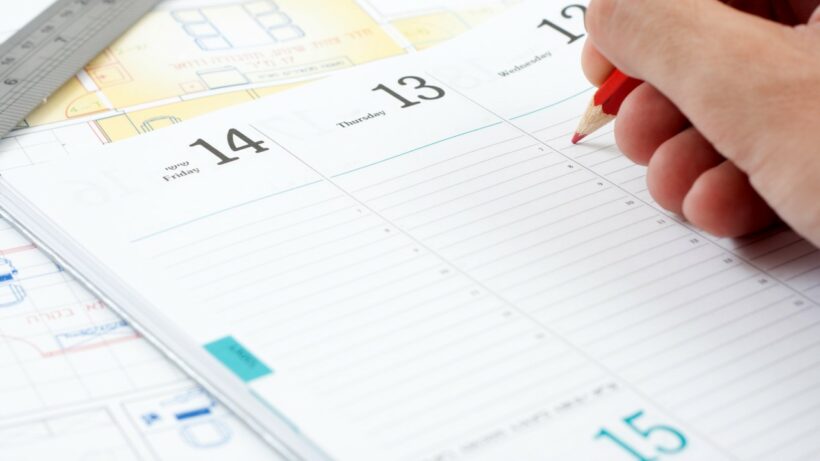
- ACADEMIC ADVICE
How to Stay Organized in College
- October 21, 2022
Table of Contents
Why you must stay organized in college, use a calendar, use to-do lists, plan realistically, take notes and digitize them, organize by class, develop a routine/follow a schedule, declutter your study space, avoid distractions, organize your backpack, reflect on your week and plan for the following, take care of yourself.
College is not easy; that’s no surprise. It is truly a challenge to keep everything on track and balanced while having other responsibilities to take care of besides your studies. Attending lectures, keeping notes , doing homework, writing essays , and having exams are standard student responsibilities. But when there’s too much to fit in in a day, students start suffering from stress . And that happens more than you think. That comes as a result of not knowing how to stay organized in college.
Staying organized all the time is not an easy process, but applying the correct practices and tips will make a difference in your current lifestyle. Let’s learn more about the importance of being organized at college and how you can achieve it.
Strong organizational skills allow students to do better in school. Many of you can be good at grasping all the information presented during class, but what fails you is the time you should spend studying afterward. Not being able to prioritize assignments and organize time evenly for each project or simply your physical space is a sign that your organizational skills are failing you.
Being organized in college will help you maintain a healthy mind and body. Imagine how good it would feel not having to worry about a tomorrow-due paper because you did the brainstorming, research, writing, and everything else according to the right schedule. Now you would simply take the time to rest. All of this would be possible if you try to invest time and effort towards becoming more organized.
And most importantly, there is a bright future awaiting you after graduation. You will be thankful for investing effort in becoming more organized because organizational skills will take you as far as you wish. That pretty much answers why you must stay organized in college: for a better future.
Tips to Stay Organized in College
Becoming an organized person takes effort, that’s no doubt. But with the right plan on your hands, it will not feel as daunting as you might think. How do college students organize their day? Well, we have created a detailed list of steps you can take to help you stay organized and ultimately result in a better study journey. If you are still curious about the tips, read on.
Students have a life outside their studies. There are family, friends, extracurricular activities, hobbies, and many other things you need to keep up with. And it becomes hectic when you don’t know what and when you should do something. There’s where the calendar comes in handy. You can use apps or online calendars such as Google Calendars or simply write everything down. Either way, it will free up so much space in your head.
Things you can add to your calendar are:
- Extracurricular activities
- Meetings with friends
- Meetings with colleagues (when you have projects)
Having a calendar does not indicate that you shouldn’t and can’t be spontaneous, but it will give you a clearer view of when you should do things. And, as you proceed with your days, you can delete or add events to your liking.
If you are ready to take things to another level, then using a to-do list will be the perfect second step. To-do lists are good for managing daily tasks. You can either prepare a to-do list a day ahead or right after you wake up.
Again, many digital apps can help you keep track of tasks, or you can use your notebook. Whatever you choose, make sure to put a tick on the box after each completed task. This will help you get more control over your life, and you will feel a sense of achievement throughout the day.
We know how good it feels to have every event and task written down, ready for us to complete, but sometimes we get carried away and keep adding more to our list than we can handle. This is a mistake you should avoid. Take your time and think before adding to your calendar or to-do list.
Let’s say you have your to-do list ready and filled with tasks, but have you planned everything realistically? Did you write down “wake up at 7am and do homework”? If you are a morning person, that will work, but if you’re a night owl, you should stay away from putting such a goal when you know you will be up late. Instead, schedule your homework at night. This way, your late nights will have a purpose, and you don’t have to worry about homework when you wake up.
Note-taking is an essential skill in itself. Knowing how to take notes and keep them organized will save you so much time during revisions and finals. More specifically, digitalizing your notes will make your life simpler.
Sometimes reading your handwriting or going through pages to find something important becomes challenging. To make the most of your notes, you should digitize them and make them searchable. When you digitize them, you can simply search by keywords. Additionally, it is easier to carry them with you anywhere.
There are many ways to organize your studying materials, and one of the best tips is to do it by arranging everything by class. You can use binders and separate each subject of each class by color.
And if you don’t like carrying binders around, you can create folders on your computer, name everything accordingly, and add your notes or sheets.
✅ Request information on BAU's programs TODAY!
Those interested in becoming organized students should know that planning ahead is the key to staying organized. Planning for the next day is one of the most important things you can ever do. By identifying your plans early, you can put measures into place and change them along the way to help you reach the lifestyle you want.
An example that would make a change is to read the syllabus your professor provides on the first day. If you read it, you will have an idea of what will be covered in each lecture, and you can go prepared.
When integrating any tips to stay organized mentioned in this article, remember that consistency matters to succeed. Implementing some actions to stay organized one day and not keeping them up for weeks won’t get you anywhere. Planning ahead, having calendars, to-do lists, or digitizing notes are all helpful if you stick to a schedule and integrate those habits into your daily life.
Most of the time, we hear people say that they get the urge to tidy up instead of study. That is because the untidy place calls for unfinished work, making it almost impossible to focus on other tasks, such as schoolwork. So, go ahead and try decluttering your study space from time to time. Clean and tidy study spaces will most certainly make you feel more productive.
Almost everything will get between you and the study session when you don’t feel like studying. Therefore, you should schedule a studying session when you are done checking emails, social media, or watching your favorite TV show. You don’t necessarily have to block yourself out of the world to study, but try to minimize using electronic devices when studying.
Sort your school materials according to how often you use them.
You can place smaller materials that you frequently use in the outside pocket of your bag. Then, beginning from the bottom up, stack your books, notebooks, and all your school materials according to how frequently you use them.
Of course, you won’t be able to sort everything in the right order if you are running late; therefore, keep in mind to organize your backpack the day before class.
Weekly reflections are an excellent method to look back on your week and consider what was learned, how you succeeded, what difficulties you had, and what goals you would like to set going forward. Weekly reflections allow you to drive and take charge of their education.
Remember that even if some tips didn’t work out the way you wanted them to, you could try new things out.
Don’t be hard on yourself. Make some time for yourself, relax, eat your favorite food or go for a walk. Find ways to reduce stress . Schedule time on your calendar for friends and family; it will help take your mind off school work and make you feel more relaxed. Remember that taking care of your mental and physical health comes first.
And if some of the tips above don’t work for you, you can always try out new methods. Don’t limit yourself.
Being disorganized in college might be dangerous. You risk misplacing important notes, forgetting classes, scheduling incorrectly, and suffering from an untidy workspace if you lack the necessary organizing abilities. But with the tips we have provided in this article, you will most certainly succeed in becoming a more organized student.
Planning things ahead will make your studying journey much easier, and you will be better prepared for work life.
Bay Atlantic University
Leave a reply.
Your email address will not be published. Required fields are marked *
Save my name, email, and website in this browser for the next time I comment.
You May Also Like
- 6 minute read
What Is A Kinesthetic Learner?
- January 25, 2022
- 7 shares 1 0 6
- 4 minute read
Preparing to Study in the U.S.: Everything You Need To Know
- June 20, 2020
- 5 minute read
Credits Required for Full-Time Enrollment
- April 8, 2022
What Is a Technical Degree and Why Is It Beneficial?
- February 23, 2024
Become a Political Consultant: Step-by-Step Career Guide
- March 22, 2022
How to Graduate Early: Reasons & Strategies to Follow
- March 25, 2021
Navigate the Levels of English as a Second Language
- April 24, 2024
Learning English as A Second Language: A Comprehensive Guide
Mastering esl teacher skills: a comprehensive guide to success, esl vs. efl: what is the difference, request information on bau's programs today.
Login or sign up to be automatically entered into our next $10,000 scholarship giveaway
Get Started
- College Search
- College Search Map
- Graduate Programs
- Featured Colleges
- Scholarship Search
- Lists & Rankings
- User Resources
Articles & Advice
- All Categories
- Ask the Experts
- Campus Visits
- Catholic Colleges and Universities
- Christian Colleges and Universities
- College Admission
- College Athletics
- College Diversity
- Counselors and Consultants
- Education and Teaching
- Financial Aid
- Graduate School
- Health and Medicine
- International Students
- Internships and Careers
- Majors and Academics
- Performing and Visual Arts
- Public Colleges and Universities
- Science and Engineering
- Student Life
- Transfer Students
- Why CollegeXpress
- $10,000 Scholarship
- CollegeXpress Store
- Corporate Website
- Terms of Use
- Privacy Policy
- CA and EU Privacy Policy
Articles & Advice > Majors and Academics > Blog
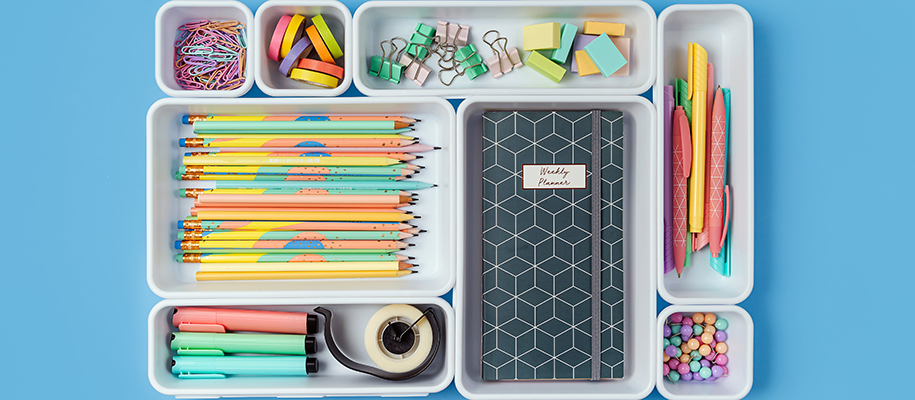
6 Great College Organization Tips From a Type A+ Student
What better way is there to get organized than taking it from a student who's great at it? Here's the advice you need to get it together this semester.
by Krysten Gross CollegeXpress Student Writer, Elmhurst College
Last Updated: Jul 27, 2023
Originally Posted: Dec 31, 2015
College changes your sleep schedule and study habits, whether you want it to or not. You’ll be busy with classes, clubs, friends, a job, and seemingly about a million other commitments—and it’s easy to get frazzled with all of this on your plate! The mistake most college students make, though, is not taking control and organizing their lives in a helpful way. You miss assignments, forget about commitments, and feel the overwhelming pressure of having too much to do and not enough time to do it. Don’t let this happen to you! Here are my best organization tips.
1. Get a planner
A paper planner is invaluable. Sometimes your college will sell them in the campus store with specific events for the school year included, but you can pick on up at Target, Amazon, Barnes & Noble, etc., depending on what you’re looking for. Pick one in a size that will be most useful to you. If you plan on carrying it in your backpack and you have big handwriting, there are larger planners. If you’re like me and often switch your planner from your backpack to another bag, a smaller one might make more sense. Mine is 6”x8”, and it goes everywhere with me.
When choosing a planner, you want to decide how you’ll use it. Do you want a monthly, weekly, daily view? Do you need all three ? Do you want to have to flip through to find the day of the week? Do you need tabs to make it quicker to find things? These are important questions! Another thing to keep in mind is how much you will be writing in it. The last thing you want is to have too many line items and not enough lines!
Related: Why Every College Student Should Keep a Planner
2. Write it out but make it fun
I love (and strongly suggest getting) multicolored pens. At the beginning of the semester, you can pick which color pen belongs to which activity. In my first year, I wrote in one color pen, and every time I would open my planner and freak out because it looked like I was booked all day, every day. Now, with each activity being a different color, I can quickly see how my day will be broken up.
Along with your portable planner, you also may want to get a monthly wall calendar. They’re great for keeping track of your big-time items, like exams and project due dates, as well as any recurring meetings and important events. This way, you can easily see into the upcoming weeks and what you will have to accomplish. And you can color-code this one too!
3. Track your to-do list
If you still feel overwhelmed, you might find making yourself a daily or weekly to-do list helpful. You could put a sticky note for each day of the week on your desk, so you can see right in front of you that Monday you have a speech due, a meeting during lunchtime, and an event at night. When you’re feeling overwhelmed , the last thing you want to do is mess up your priorities and work on something that isn’t due for a week while the assignment due tomorrow is forgotten! Plus, at the end of each day when everything is completed, you can throw away the sticky note and watch yourself get through the whole week.
4. Use your phone or tablet
If you’re not a paper-and-pen kind of person, there are plenty of apps to help you with time management. In fact, you can use the reminder app already on your phone for things like paying bills, tests, work, or anything else you can think of. Here are some other organization apps you can download that may also be helpful:
- Planner Plus: It automatically connects to your calendar and any Facebook events. You can input Tasks or Projects, assign them a priority, and be alerted when due dates are upcoming.
- myHomework Student Planner: A free app where you can input homework assignments. It’ll ask you for a brief description, which class it is for, the priority level, and the due date. If your professors use Teachers.io, you can import your classes from there, otherwise, you can manually add them.
- Pocket Schedule Planner: This app prompts you to add a semester and all your courses, picking a color for each course. You can input the days and times, and even the location and the professor! You can also add exams and assignments with descriptions, pick due dates, set priorities, and schedule reminders.
Related: Over 20 Apps to Help You Get Through Tough Finals This Semester
5. Create a filing system
To keep your college class materials organized, have a folder with enough pockets for all your classes or individual folders or binders for each class. In addition, have a separate notebook for each class so you won’t get confused when your biology materials get mixed up with your public speaking notes. Organize these materials in the order of the classes during the week. When you’re finished, put them at the back of the stack, so at the end of your week, they’ll be in order for the next week!
6. Get ready the night before
Preparing for your classes the night before saves you precious sleep time in the morning. This includes packing your backpack for the day. Stick whatever books, notebooks, and folders you’ll need for your classes. I always pick my outfit the night before because it gives me more time to try everything on and decide what I like, which is way easier than in the morning when it’s dark and my roommate is still asleep. And if by chance you sleep through your alarm, you at least know you can just grab your backpack and go!
Related: 5 Easy Ways to Get Organized in College
if you feel like you’re drowning in all of your responsibilities, try a couple of these tips! You might be surprised by how much they help. Everyone learns what best works for them throughout college, and now you have a solid foundation to develop your own successful ways of organizing!
You can find a ton more advice on staying on top of your school life in our Majors and Academics section.
Like what you’re reading?
Join the CollegeXpress community! Create a free account and we’ll notify you about new articles, scholarship deadlines, and more.
Tags: academics majors and academics organization organization skills planning study skills time management
← Previous Post
Next Post →
About Krysten Gross
Krysten Gross is an Elmhurst University student from the Chicagoland area. She's a big fan of social media, reading, listening to music, and singing loudly and poorly. She has loved her college experience thus far and is excited to share the knowledge she's picked up on the journey!
Join our community of over 5 million students!
CollegeXpress has everything you need to simplify your college search, get connected to schools, and find your perfect fit.

Maya Ingraham
October 2021 Mini Scholarship Winner, Class of 2022
CollegeXpress has given me more confidence in my college process. With easy-to-access resources and guidance such as the CX Weekly Roundup, I have been able to find the best colleges for me. Most importantly, there’s a surplus of scholarship opportunities for every student to support their education.

Heather McCarty
High School Class of 2020
CollegeXpress has helped me with the college application process. The tips and tricks for important essays were so helpful. I also gained useful knowledge about college life. Even though I’m fully online, CollegeXpress has helped me develop a sense of how college is in person. The experiences from college students that were featured on their Instagram page have shown the good, the bad, and the “secret” life on campus from a reliable perspective. Not to mention, they relieved my feelings of anxiety about the workload. I can now understand how it can be stressful, but it takes self-control and willpower to get assignments completed on time and with quality.
High School Class of 2022
Starting the college admissions process as an international student was daunting. Thankfully, CollegeXpress was the first website I used for that cause and it helped me so much, from knowing where to start to deciding what my next move would be. I'll take a gap year, but I’m certainly using the website again when applying for fall 2023.
High School Class of 2021
CollegeXpress really helped me by letting me know the colleges ratings and placements. They gave me accurate information on my colleges tuition rates and acceptance. They even let me know the ration between students and faculty and the diversity of the college. Overall they told me everything I needed and things I didnt even think I needed to know about my college and other colleges I applied for.
Kelly Nogueiro
For me, CollegeXpress has given me a valuable tool to use with my students to explore colleges easily beyond objective data. It helps me find colleges for students that fit their needs and wants that aren’t quite so black and white. It's a wealth of knowledge, and the Type-A side of me loves all the lists and the fact that I know they're coming from folks who know what they're talking about. I share it with colleagues and students alike, and it's always well received.
Colleges You May Be Interested In
Valdosta State University
Valdosta, GA
Rochester Institute of Technology
Rochester, NY
Wayne State University
Detroit, MI
Bishop's University
Sherbrooke, Quebec, Canada
Mount Saint Mary's University
Los Angeles, CA
Personalize your experience on CollegeXpress.
With this information, we'll display content relevant to your interests. By subscribing, you agree to receive CollegeXpress emails and to make your information available to colleges, scholarship programs, and other companies that have relevant/related offers.
Already have an account?
Log in to be directly connected to
Not a CollegeXpress user?
Don't want to register.
Provide your information below to connect with
Search form
How to write the best college assignments.
By Lois Weldon
When it comes to writing assignments, it is difficult to find a conceptualized guide with clear and simple tips that are easy to follow. That’s exactly what this guide will provide: few simple tips on how to write great assignments, right when you need them. Some of these points will probably be familiar to you, but there is no harm in being reminded of the most important things before you start writing the assignments, which are usually determining on your credits.
The most important aspects: Outline and Introduction
Preparation is the key to success, especially when it comes to academic assignments. It is recommended to always write an outline before you start writing the actual assignment. The outline should include the main points of discussion, which will keep you focused throughout the work and will make your key points clearly defined. Outlining the assignment will save you a lot of time because it will organize your thoughts and make your literature searches much easier. The outline will also help you to create different sections and divide up the word count between them, which will make the assignment more organized.
The introduction is the next important part you should focus on. This is the part that defines the quality of your assignment in the eyes of the reader. The introduction must include a brief background on the main points of discussion, the purpose of developing such work and clear indications on how the assignment is being organized. Keep this part brief, within one or two paragraphs.
This is an example of including the above mentioned points into the introduction of an assignment that elaborates the topic of obesity reaching proportions:
Background : The twenty first century is characterized by many public health challenges, among which obesity takes a major part. The increasing prevalence of obesity is creating an alarming situation in both developed and developing regions of the world.
Structure and aim : This assignment will elaborate and discuss the specific pattern of obesity epidemic development, as well as its epidemiology. Debt, trade and globalization will also be analyzed as factors that led to escalation of the problem. Moreover, the assignment will discuss the governmental interventions that make efforts to address this issue.
Practical tips on assignment writing
Here are some practical tips that will keep your work focused and effective:
– Critical thinking – Academic writing has to be characterized by critical thinking, not only to provide the work with the needed level, but also because it takes part in the final mark.
– Continuity of ideas – When you get to the middle of assignment, things can get confusing. You have to make sure that the ideas are flowing continuously within and between paragraphs, so the reader will be enabled to follow the argument easily. Dividing the work in different paragraphs is very important for this purpose.
– Usage of ‘you’ and ‘I’ – According to the academic writing standards, the assignments should be written in an impersonal language, which means that the usage of ‘you’ and ‘I’ should be avoided. The only acceptable way of building your arguments is by using opinions and evidence from authoritative sources.
– Referencing – this part of the assignment is extremely important and it takes a big part in the final mark. Make sure to use either Vancouver or Harvard referencing systems, and use the same system in the bibliography and while citing work of other sources within the text.
– Usage of examples – A clear understanding on your assignment’s topic should be provided by comparing different sources and identifying their strengths and weaknesses in an objective manner. This is the part where you should show how the knowledge can be applied into practice.
– Numbering and bullets – Instead of using numbering and bullets, the academic writing style prefers the usage of paragraphs.
– Including figures and tables – The figures and tables are an effective way of conveying information to the reader in a clear manner, without disturbing the word count. Each figure and table should have clear headings and you should make sure to mention their sources in the bibliography.
– Word count – the word count of your assignment mustn’t be far above or far below the required word count. The outline will provide you with help in this aspect, so make sure to plan the work in order to keep it within the boundaries.
The importance of an effective conclusion
The conclusion of your assignment is your ultimate chance to provide powerful arguments that will impress the reader. The conclusion in academic writing is usually expressed through three main parts:
– Stating the context and aim of the assignment
– Summarizing the main points briefly
– Providing final comments with consideration of the future (discussing clear examples of things that can be done in order to improve the situation concerning your topic of discussion).
Normal 0 false false false EN-US X-NONE X-NONE /* Style Definitions */ table.MsoNormalTable {mso-style-name:"Table Normal"; mso-tstyle-rowband-size:0; mso-tstyle-colband-size:0; mso-style-noshow:yes; mso-style-priority:99; mso-style-parent:""; mso-padding-alt:0in 5.4pt 0in 5.4pt; mso-para-margin:0in; mso-para-margin-bottom:.0001pt; mso-pagination:widow-orphan; font-size:11.0pt; font-family:"Calibri","sans-serif"; mso-ascii-font-family:Calibri; mso-ascii-theme-font:minor-latin; mso-hansi-font-family:Calibri; mso-hansi-theme-font:minor-latin;}
Lois Weldon is writer at Uk.bestdissertation.com . Lives happily at London with her husband and lovely daughter. Adores writing tips for students. Passionate about Star Wars and yoga.
7 comments on “How To Write The Best College Assignments”
Extremely useful tip for students wanting to score well on their assignments. I concur with the writer that writing an outline before ACTUALLY starting to write assignments is extremely important. I have observed students who start off quite well but they tend to lose focus in between which causes them to lose marks. So an outline helps them to maintain the theme focused.
Hello Great information…. write assignments
Well elabrated
Thanks for the information. This site has amazing articles. Looking forward to continuing on this site.
This article is certainly going to help student . Well written.
Really good, thanks
Practical tips on assignment writing, the’re fantastic. Thank you!
Leave a comment
Your email address will not be published. Required fields are marked *
Save my name, email, and website in this browser for the next time I comment.
- Stanford Home
- Maps & Directions
- Search Stanford
- Emergency Info
- Terms of Use
- Non-Discrimination
- Accessibility
© Stanford University , Stanford , California 94305 .
💥 Our new & improved browser extension lets you manage your meetings, scheduling links, and contacts in a single click
7 best student planner apps
The best apps to help students keep track of classes, homework, due dates, quizzes, and more.

Thad Thompson Jan 21, 2022
12 min read

Table of contents
Experience scheduling automation for yourself!
Create a Calendly account in seconds.
If you're a student, you need a system to organize classwork, exams, and life in general. And it's true, there is an app for everything. But there are lots of apps for planning and time management. Which ones make effective school planner apps?
When deciding on a planner app, you should obviously look for one with features most relevant to your life and your schedule. It should have a distinct purpose. And It shouldn't be thought of as a one-size-fits all productivity app . Here are the qualities to look for in a good student planner app:
Visually clean user experience vs. info-dense
Highly customizable vs. highly structured
Integrated with other apps vs. self-contained, with all the features you'll need in one place
Specialized for students vs. transferrable to post-school life
Here, you can check out just a few of the best school planners currently available. Each is highly rated, affordable, and, in several cases, geared specifically toward school and study. And they’re easy to find. Most are available in the Apple App Store or Google Play store for use on your iPhone, iPad, Android, or other smartphone.
7 great planner apps for high school and college students
Android, iOS, and desktop: Free with paid upgrades available
Todoist is a project planner and to-do list all in one. Used by companies like Amazon and Disney, and made for everyone from students to executives, Todoist is an app that can carry you through school and beyond.
Although you can pay to upgrade, the free version offers more than most students are likely to need. Todoist includes features that help you:
Enter important details or to-dos in a note-taking section before you forget them
Set up projects for each class and any other activities or hobbies you're involved in
Add "next action" items, so you can always look ahead to your next assignment
Cross items off your checklist without losing them for good
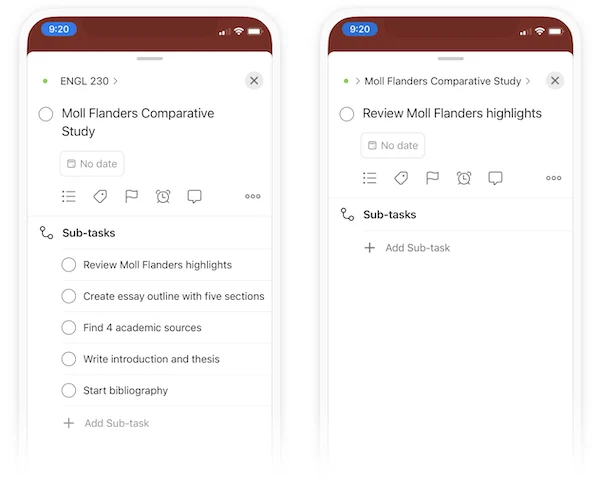
Other helpful features include due dates for individual tasks and reminders that pop up on your phone or email. You can customize every feature, so you won't get lots of notifications without asking for them.
Todoist also allows you to label tasks. You can label by priority, context (laptop work, library, etc.), or any other system you want to create. You can also indicate recurring tasks, like weekly quizzes, so you never miss an assignment.
2. Microsoft To Do
Android, iOS, and desktop: Free with Microsoft account
A reworking of the long-appreciated Wunderlist, Microsoft To Do has continued to evolve its features to make it stand out in the field of student planner apps.
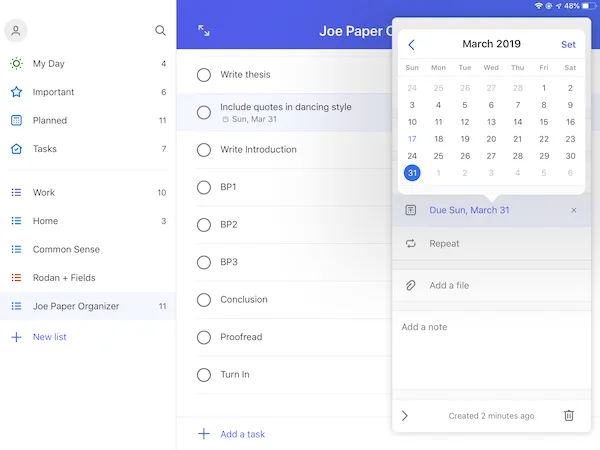
One feature that stands out in To Do is that things you didn't check off from previous days stay in the “Yesterday” box. That way you can specifically choose which items to transfer to "My day," and plan a better time for those that won't fit in today's schedule.
To Do allows you to sort tasks into basic lists that you set up, such as "Work," "Home," or "Lab." You can then add subtasks to the items on each list. For example, if your list includes, "Presentation for econ class," create subtasks for "Brainstorm subjects," "Find sources," or other project milestones.
To Do also includes some features that will please visually oriented people. Dark mode is helpful if you're reviewing your day just before sleep or when you first wake up in the morning. You can also change the background for each list, with lots of modern and inspiring designs.
3. Calendly
iOS, Android, and desktop: Free with additional features available on paid plans
Calendly simplifies scheduling with groups and individuals. As group projects have become the new normal, you’ll likely have to set up plenty of meetings with groups and individuals during the course of your time as a student. You can save a lot of time by scheduling and managing those meetings with Calendly.
Here's how it works:
Connect Calendly with your digital calendar, like Google Calendar , Outlook , and others.
Create a meeting request.
Set the parameters. For example, you can let recipients see your availability, so they can pick a day and time, or you can set a day and time and they can either accept it or request a different time.
Select recipients and send.
Calendly will gather responses from the people you want to meet with, and you'll have a meeting set up without the long texting thread that's usually required.
Other helpful features include the options of Round Robin or collective scheduling on the paid plans. If others share their availability, Calendly will show times that work for everyone, so you can pick. Or, you can use its Meeting Polls feature to let people vote on proposed times before setting your meeting . Also, you can set reminders both for yourself and for those who agreed to meet with you.
Calendly streamlines setting up meetings, so you can free up your time and attention for classes and other responsibilities.
Get started with Calendly
Ready to make scheduling easier than ever?
4. iStudiez Pro
Android, iOS, and desktop: Free with available paid Full Version upgrade
iStudiez Pro is one of the highest-rated planner apps designed just for students. Enter your class schedule including the professor's name, contact info, and office hours. Then, you can color code your classes and use icons to make it visually interesting and easy to scan.
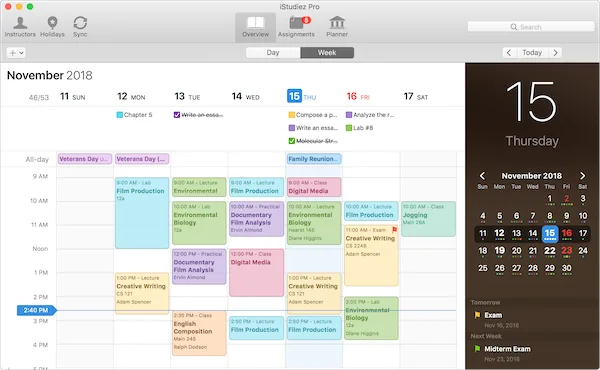
"Week view" allows you to plan your time and get ready for upcoming classes. "Day view" shows you tasks and scheduled items for today. For each class, you can add assignments, their due dates, and specific tasks associated with them.
If you upgrade to the Full Version of iStudiez Pro, you can even get a regular update on your GPA. As you receive graded assignments back, enter the grade and point value. iStudiez will do the calculating for you with its GPA tracker. It keeps this info from semester to semester, so you can keep the big picture in mind.
5. myHomework
Android, iOS, and desktop: Free or $4.99 per year for Premium
The myHomework student planner is a clean and simple planner app for education. Many teachers have already adopted it for e-learning or online instruction, but it's great for individual use as well.
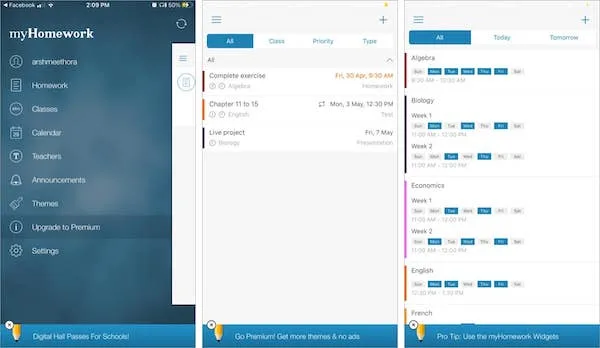
It's formatted for several types of class scheduling, such as block, period, or time-based schedules. myHomework allows you to not only input assignments and add tasks required to complete them, it also allows for prioritizing and categorizing tasks, so you can focus on what's most needed at any given time. You can set reminders for upcoming due dates too, so you don’t miss deadlines by accident (or procrastination).
While you do need internet connectivity to sync with other devices, this homework app still has full functionality even when you're not connected to WiFi. The free version has plenty of great features, but the paid version of this homework planner lets you get rid of ads as well as share assignments, add file attachments to assignments, and switch out your theme.
6. Power Planner
Android, iOS, and desktop: Free with paid upgrade available
Power Planner is a well-established student planner app with many of the same features as myHomework and iStudiez, like entering your schedule, keeping track of your GPA, and viewing assignments and exams.
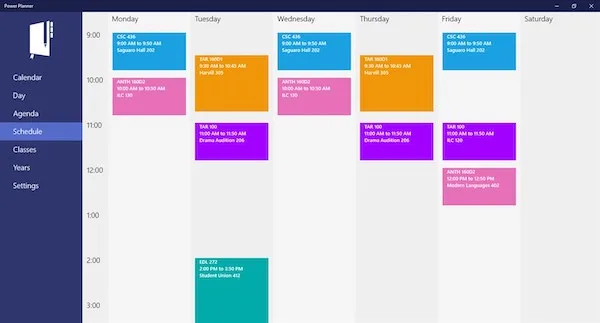
Though the app is full of useful features, one element that sets it apart from other similar apps is the responsiveness of the developer. Power Planner is updated regularly, offering continual improvements to its features.
The GPA calculator is more robust in this app compared to others, with its "What if?" feature, which calculates what scores you need on assignments to get an A in a class. It also includes notifications for due dates coming up. The paid version allows you to enter more grades and stores your GPA info from one semester to the next.
Android, iOS, and desktop: Free with multiple paid plans starting at $5, and an automatic student discount
ClickUp is the only productivity platform built to tackle everything from complex projects to your daily assignments, all in one screen. With hundreds of customizable features to organize documents, take notes, schedule due dates, and more, ClickUp is a great daily planner for students at every level.
ClickUp's flexible organizational Hierarchy is perfect for breaking down course loads into manageable tasks, subtasks, and Checklists. There are over 15 ways to visualize your schedule in ClickUp including a dynamic Calendar, List, and Everything view for a high-level look at all projects and deadlines. Plus, ClickUp's Home feature syncs with your favorite calendar app to present your classes, reminders, and messages conveniently alongside your upcoming tasks.
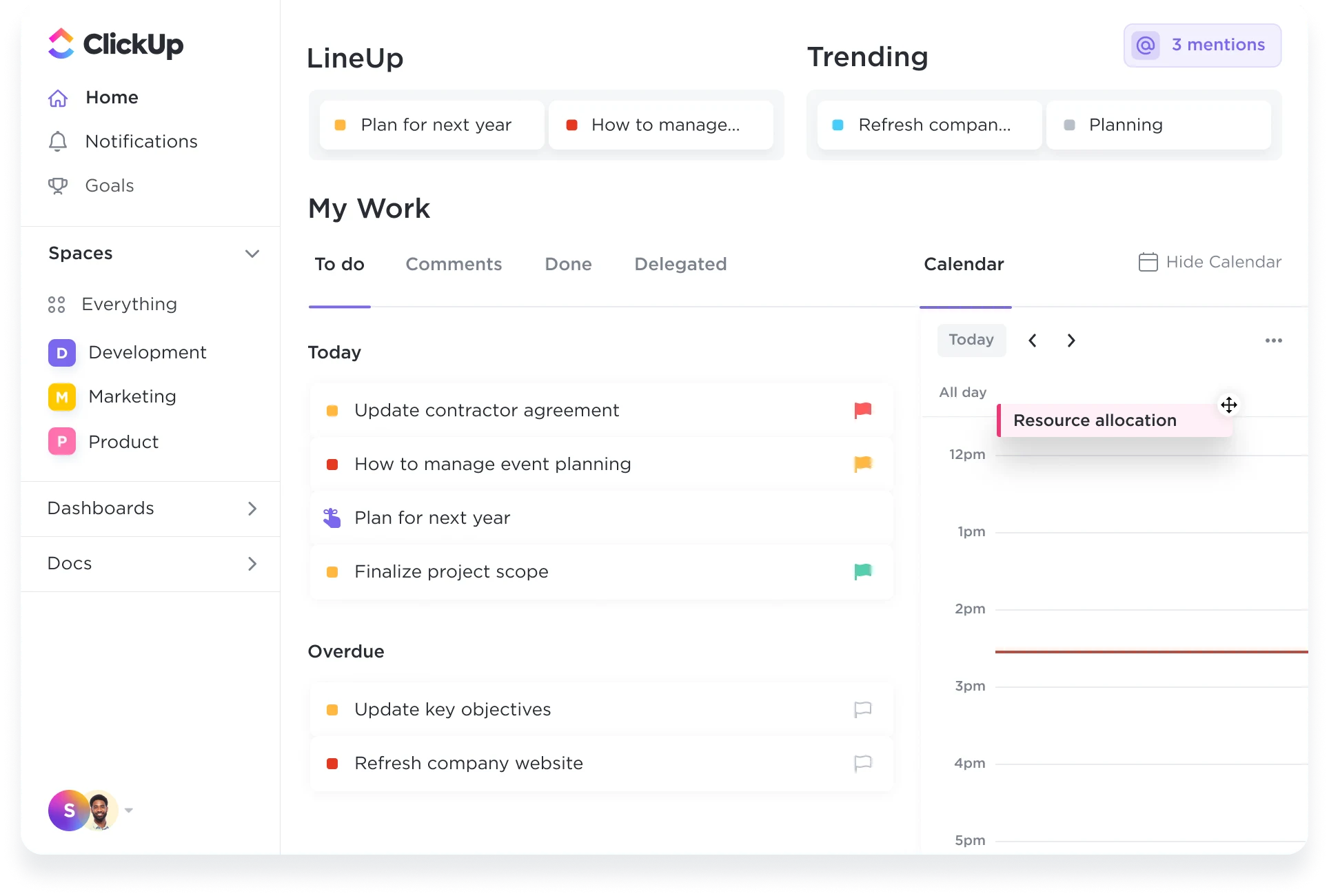
ClickUp was built to consolidate your work into one centralized hub that can be accessed virtually anywhere, even offline, from your phone, or on your Apple Watch. You can create detailed course notes, format drafts, and everything in between using ClickUp's built-in document editor, then export or share them in seconds with a simple URL.
Access its top daily planner features, ClickUp Docs, unlimited tasks, over 1,000 integrations, and more when you sign up for ClickUp's Free Forever Plan, and automatically save 25% on any paid plan for being a student.
3 tips for getting the most from your student planner app
In addition to finding a great app for students, these tips can help you increase your productivity and keep your schedule running smoothly. No matter which app you choose, you’ll get more out of it if you use it alongside smart planning practices.
1. Treat yourself to a semester review
At the beginning of each semester, set aside a couple of hours to prepare yourself and get everything organized in your app and in your head. Make it fun: Take yourself out for coffee, turn on your favorite music, and turn off your texting and other notifications. This is time to get in the zone.
Give yourself time to look through your new app's features and figure out the best way to use them (or customize them) for you. It's helpful to read reviews, as people will talk about the most useful features. It's also an easy way to learn how to use the app.
Gather your syllabi, work schedules, and any other pertinent calendar info. First, enter all your calendar info for the semester. This helps you understand what your weekly schedule will be like. Then create projects or enter assignments (and due dates) for any big projects your professors already have planned.
For example, the class may require a video assignment due at the end of the semester. Create a task called "plan out video project," and set the due date for around the time you want to begin the project. You don't want to get bogged down in planning the details of all those projects during your semester review. If you stay focused on the big picture, you may have time for more specific project planning at the end of your review session.
This is also a good time to set goals for yourself. Do you want to turn in more assignments on time or participate more in class? Do you want to learn a new instrument or join a team? Get inspired about doing more than just making it through the semester. With a powerful school planner app on your side, this could be your best semester yet — and there's more to that than just getting good grades.
2. Add a weekly review to your calendar
To keep your planner system functional, you have to keep giving it attention. Set up a time every week — about 30 minutes to an hour — for reviewing your projects and planning out your weekly schedule. Make this appointment as set-in-stone as your class times, so you aren’t tempted to put it off.
You can use this time to input any grades you've received if you've chosen an app with a GPA-tracking feature. Make sure that for every project, assignment or exam, you've entered specific tasks to prepare for them as well. You don't want to just remember that you have something due. You want to have a plan for turning in your best work!
This is also a great time to set up meetings you'll need for the week. Use an app like Calendly to send out requests for meetings, so you're not scrambling at the last minute to find a time when everyone can meet.
And don't forget to schedule some rest! One of the best ways to stay motivated and stick with your work is to know you have some quality fun time coming.
3. Plan daily check-ins
Every morning look over your daily schedule and your list of things to do. This usually doesn’t take more than five minutes, but it can do a lot to help you bring your best to the things that are important to you.
Improve your learning through great planning
Choosing the student planner app that’s right for you is a great way of keeping your mind focused and your grades high during the semester. A great app will help you stay on top of your classes and work, especially if you keep your app up-to-date with regular reviews.
A great calendar app can also help you to make the most of the other aspects of your life, for a less stressful, more rewarding student experience. The world needs what you have to give, and these apps can help you give your best.
Webinar: Getting started with Calendly
Thad Thompson
Thad is a former Content Marketing Manager at Calendly. When not sharing scheduling and productivity insights, you’ll find him hiking trails with his family or thumping a bass with a power pop band.
Related Articles
Read Time: 12 minutes
Top 10 best organizational tools for 2023
Get organized and get the results you want with our favorite easy, affordable apps.
The best online planner (hands down)
For business owners, busy professionals, or anyone just trying to tame calendar chaos.
The 12 best apps to make 2022 your most productive year yet
Save time with the best productivity apps and time management tools on the market.
Don't leave your prospects, customers, and candidates waiting
Calendly eliminates the scheduling back and forth and helps you hit goals faster. Get started in seconds.
- Skip to primary navigation
- Skip to content
- Skip to primary sidebar
- Skip to footer
Modern Laine
Southern Charm | Modern Flair
Organized Chaos: College Assignment Tracker
January 26, 2016 · College
Every student needs this college assignment tracker!
College assignments are such a headache! That’s why I made a college assignment tracker. This semester, though it feels late in the game as I will graduate this year, I decided to start the semester off right. To do this I created an assignment and readings spreadsheet to track the due dates of all my assignments and what I should be reading each day for each class. I’m going to share how I designed my assignment and reading tracker.

I got the idea for a college assignment tracker from Kirsten at Organized Charm and Dani at Dani Dearest . I think it’s amazing, however I changed it a little to fit my style and to include a reading tracker. As an English Major I read about 200 or more pages a week. Let me show and explain how I made and am using my assignment tracker.
NOTE: Set aside about 2 or 3 hours your first weekend back to school to go through your syllabuses and to set up the assignment spreadsheet.
Trying to find the best way to manage your readings and assignments for college? Learn how to make a college assignment tracker now! Click To Tweet
STEP ONE: Gather Your Syllabuses and Highlighters
The first step in making an assignment or reading tracker is to gather all of your class schedules and syllabuses. Go through each one, highlighting all big assignments like papers or tests. Once you’ve highlighted the important due dates and assignments then you’ve done one of the hardest parts.
STEP TWO: Create and Format your Spreadsheet
Create an Excel spreadsheet. Mine has four columns: Due Date, Class, Assignment and Points. This setup works best for me. I went through each syllabus and added the assignments. Once you made your spreadsheet begin to add your assignments. As I mentioned, I have a separate sheet for Assignments and another for Readings. With so many readings and assignments it felt to overwhelming the other way.

STEP THREE: Organize your Spreadsheet
I recommend adding your assignments or readings by date and then if you have another assignment on the same date or a previous date just click the insert row button. For me this was the easiest way to do it, though Kirsten and Dani both suggest the AZ Sort function. I organize my sheet by month, but you might find it easier to organize by class or even week. For my reading list I added an extra row between each week just so it felt more manageable.

STEP FOUR: Print & Staple
Once you’ve filled in your assignments check the print preview and make sure it all fits width wise on one sheet. You may have to play with font types or sized and the size of the columns until you get it just right. On my Readings sheet I deleted the Completed column because the readings are so long. In the end this worked out better as it is very easy to just highlight completed readings and the page doesn’t look super overwhelming.
You can also use it only on your computer or tablet. Microsoft makes an Excel for the iPad that I find easy to use and there is Google Sheets. These are both great options if you don’t want to print and keep track of your sheets as a hard copy or if you may have to add or change your sheets often.
Here are a few final tips:
- Make the time to setup your college assignment tracker. Sure, it is tedious, but 2 or 3 hours at the beginning of the semester is worth it when you think of all the studying, reading and assignments you have to do over the semester. Being prepared now will help you considerably later in the semester.
- Actually use your assignment tracker! This is a big point for me, because why go through the trouble of making a tracker if you don’t plan to keep up with it. I can tell you honestly that in the three weeks I’ve been in school this semester I have seen a major improvement in my stress level about assignments and readings.
- Don’t go crazy with highlighting or color coding. I considered coloring coding my spreadsheet, but decided it against it because with five classes and five colors the sheets would just become overwhelming and pointless in relieving stress about my assignments. Instead just make sure to mark what course each reading or assignment is for and then use a highlighter when completed or use the strikethrough option if you’re keeping a virtual copy.
- Adjust the format to fit your classes and style. There are many ways to set one of these up, just find what works for you. The only thing that matters is that you stick with it. This can’t work unless you make sure to use it. I’ve seeing a great improvement in my stress, time management and grades since creating and using my sheets.
- Only put the most necessary information on your tracker. Page numbers and due dates are important. School holidays like Spring or Fall break are important or if you’re on a quarter instead of semester schedule, those dates are important. Sorority, work, club or other types of events? Those are probably best left for your day planner.
Are you going to make a college assignment tracker? Share you experience with me!
Share this:
- Click to share on Facebook (Opens in new window)
- Click to share on Twitter (Opens in new window)
- Click to share on Pinterest (Opens in new window)
- Click to share on Pocket (Opens in new window)
Related posts:
- How To Take Notes That Will Help You Pass
- Using OneNote: An Introduction for College Students
- Organized Chaos: Color Coding My Day Planner
- Back To School Tips From A College Senior
Twenty-six year old living in the Charleston, SC, also known as the Holy City.
I graduated from the College of Charleston in 2017 with a bachelor’s degree in English and I recently completed my master’s degree in Mass Communication specializing in Social Media at the University of Florida.
I spend my days on social media and handling the marketing for a local business. I’m also working to grow my own business offering social media and digital organization services.
Connect With Me
Top 7 Homework Planner Apps for Students
Whether you are attending classes, completing your assignments, studying for a quiz, project work, extra-curricular activities, or squeezing some time for friends and family. You’d agree that organizing and planning goes a long way. That’s why a homework organizer or a homework planner app can be a lifesaver to keep track of all your assignments, tests, submission deadlines, and exams. I did the research and shortlisted the perfect homework planner apps for Android and iOS. Let’s check those out.
Read: Best Notes App for Windows to Increase Productivity
Homework Planner Apps for Students
1. student planner- homework agenda & notes.
The first app on the list is a simple homework and notes management app. It keeps track of homework, assignments, projects, and to-do lists. The layout is minimal, all the tasks are neatly organized with a colored bookmark for easy identification. You can mark a task complete and remove it from the pending list.
Courses can be added easily and color-coded as well. The calendar shows any upcoming deadlines so you can prioritize accordingly. The tasks have a progress bar that you can adjust as you make progress which enables you to get a quick summary without actually opening every task.
You can also break your assignments in small chunks as subtasks that would make finishing a task much easier and the progress bar will fill automatically. It also allows you to attach media files to your assignments or projects for easy access to the important information in one place.

- Progress bar
- Deadline Reminders
- Calendar View
- No option to sync data to the cloud
Student Planner is a great app for all the students, it has all the necessary features like Deadline reminders, subtasks, progress bar, color-coded tasks, and courses. It can significantly increase your productivity when used regularly. You can get this app for free in the Play Store.
Install Student Planner- Homework Agenda ( Android )
2. Student Planner
Student Planner is another fast and simple homework management app which is wrapped by a beautiful and intuitive material designed UI. What Student Planner adds to the table is the inclusion of a schedule or time table which you can use to either store your class schedule or it might even be a study schedule for your exams.
You first start by adding your subject and the schedule then you can add an assignment or set a reminder. The due assignments are arranged as separate cards and can be swiped away once done with.

- Simple and easy to get started with
- Fast and small in size
- Beautiful Minimal UI
- Option for Schedule
- No sync/backup
- Timetable implementation not perfect
I would recommend this app to anyone who is looking for a simple homework management app with timetable support and a minimal UI.
Install Student Planner ( Android )
Egenda is simple. Open the app, add all the classes or subjects to the app, and once that is set up, you have the option of adding a new Homework, Quiz, Project, or Test and choose the respective subject deadlines. The app also arranges the due work in cards that can be swiped away when done. But what I love the most about this app is that the fact it allows you to go subject-wise and view all your upcoming tests, projects, or pending assignments which is a huge convenience for planning your schedule ahead of time instead of the previous day.
Unfortunately, the app doesn’t have a timetable option, but in its latest update, it added a Calendar View where you can see your whole month at a glance with your assignments, tests, and projects.
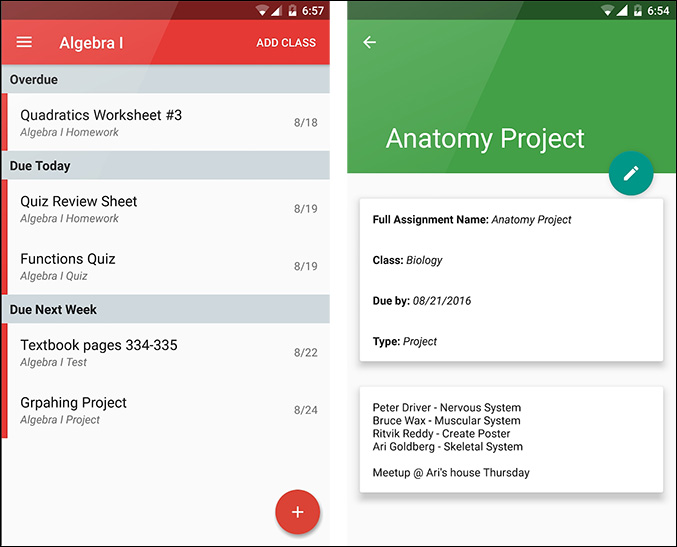
- Subject-wise sorting
- Calendar View
- No timetable support
Egenda provides some great tools for Homework and Test planning and I am sure anyone would find them extremely convenient and useful. But keeping its single con in mind, go for this app if you are not too keen on having a schedule or timetable.
Install Egenda ( Android | iOS )
4. ChalkBoard
The next app on our list is ChalkBoard, which I found out to be a pretty smart homework planner app. Chalkboard strikes a perfect balance between simplicity and features.
Although the setup process is a little longer than the previous three apps, as you have to feed meticulous details about the classes, teacher, and schedule. It is worth the effort.
On the home screen, you are shown upcoming classes, events tab, and upcoming tests. ChalkBoard fetches the dates for every subject from the Timetable for your future classes. Little features like these make the app stand out from the rest and give an overall great experience. You can also view classes and assignments subject wise.
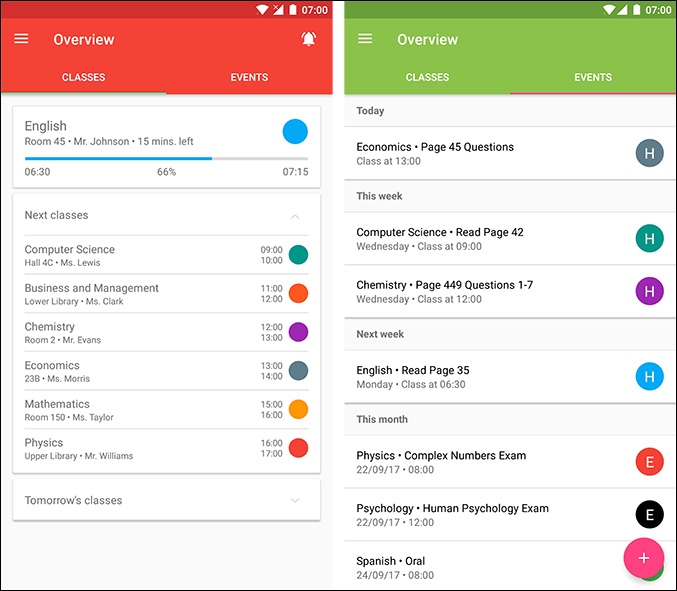
- Proper Timetable
- Ability to add teachers for subjects
- View tomorrow’s classes as well as assignments/tests/quizzes
- Smart features
- Little longer to set up
- No calendar view
If you are looking for a homework planner as well as a school planner, Chalkboard is the app as it strikes a great ground with almost all the features one might need while not being too bulky.
Install ChalkBoard ( Android )
5. School Planner
School Planner is a full-fledged planning application designed for students to manage their career as a student. Along with your homework and timetables, School Planner offers you to keep track of your grades and attendance, add contacts for teachers, add recorded lectures, and even multiple planners.
The app supports backing up of all your data via Google Drive, Calendar View along with a weekly report, attaching snapshots to your assignment reminders, student accounts from ClassViva, and a lot more. In spite of so many features, the app doesn’t feel slow at all and delivers a powerful performance with its beautiful design.

- Full-fledged student companion
- Feature-packed and free
- Supports sync and backup
- Widget Support
- Tedious setup procedure
- Big in size
- Complex, not so smooth learning curve
While it is not for someone who is looking for a fast and easy way into homework management, School Planner is a great student companion app and serious students will surely get the most out of hit.
Install School Planner ( Android )
6. My Study Life
My Study Life comes with its own web app and syncs with the Android app, essentially making your data accessible from any device as long as it has a browser.
It implements a goal-centric circular tracker that shows your progress. The Calendar view combines your timetable, deadlines, and shows all your classes and assignments, projects in a single place.
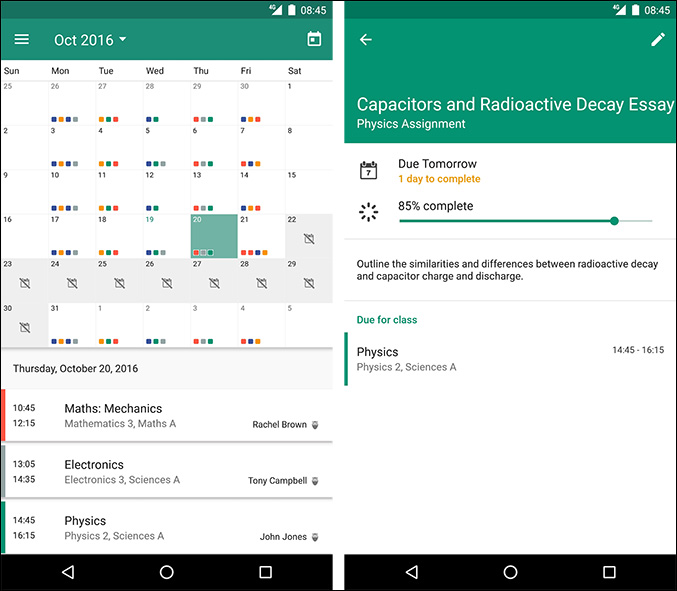
- Refreshingly new UI
- Access from anywhere through its web app
- Sync and Backup
- Lengthy setup process
If you study from your computer or laptop, My Study Life makes it easy to access your homework planner on your phone from your computer, while not compromising on features and being completely free. What more can you ask for?
Install My Study Life ( Android | iOS )
7. iStudiez Pro
Like School Planner, iStudiez Pro includes grading and subject wise organization of tasks. iStudiez Pro takes it further with the integration of Google Calendar that allows you to directly get all your holidays, exam schedule, routine from Google Calendar itself.
It also offers separate apps on all platforms including iOS, Mac, and Windows. All the apps sync seamlessly between themselves, so studying on your computer consulting your planner won’t be an issue.
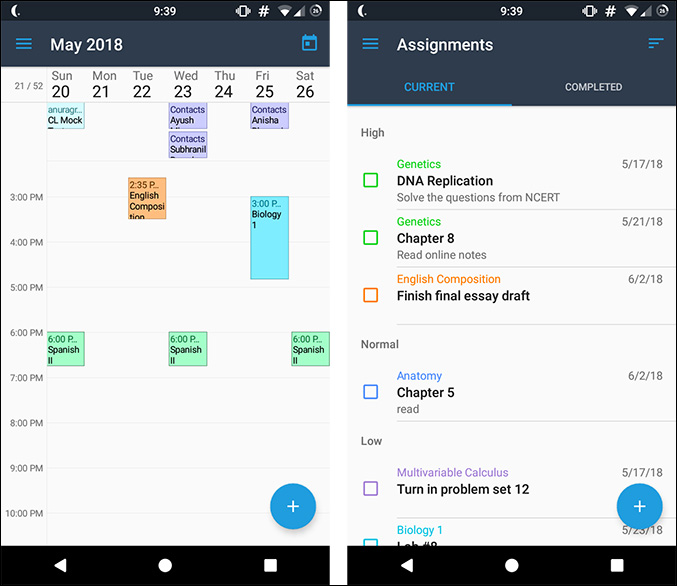
- Google Calendar Integration
- Cross-Platform
- Cumulative Price
If Google Calendar integration and cross-platform support is a must for you, iStudiez Pro is definitely the app you want.
Install iStudiez Pro ( Android | iOS )
So this was our roundup of the best homework planner apps for Android. We genuinely think that there is an app for every need and we hope that you found a Homework Planner that suits your need whether you are a high school student or a college senior. So which one was your favorite or did we forget to add yours? Let us know in the comments below.
Also Read: Take a Picture of Handwriting And Convert to Text – Android Apps
Sometimes I write. Business Enquiries: [email protected]
You may also like
6 fixes for samsung tv or monitor stuck..., a guide to using phone link on windows..., 2 ways to change app icon size on..., what is secret mode in samsung internet and..., you can share location using this siri shortcut..., this siri shortcut for iphone can help when..., what does the bell icon mean on various..., 3 best automatic captioning apps for reels and..., what happens when you delete a chat on..., why notion also works well as daily planner, leave a comment cancel reply.
You must be logged in to post a comment.
Stand Out in High School
When applying to college, make sure your application showcases who you are in and out of school. While grades and test scores are important, colleges also want to see the person you're becoming and the skills you've learned outside of class.
High School Classes Colleges Look For
If you’re in high school and thinking about college you should know that the courses you take matter. That’s because college admissions officers want to see a solid foundation of learning you can build on in college.
How to Convert Your GPA to a 4.0 Scale
Colleges report GPA (grade point average) on a 4.0 scale. See how to calculate your GPA and convert your grades to the 4.0 scale.
Extracurriculars Matter—to You and to Colleges
Participating in extracurricular activities like clubs, sports, or a job can foster new interests and help you discover more about yourself. It can also show colleges your dedication and leadership skills.
Organize College Applications in Google Sheets
Create a spreadsheet to track and organize your college applications using Google Sheets.
Example outcome

- Teaching Materials
Time to complete
access_time 45—90 minutes
Digital tools
- Data analysis
- Spreadsheet design
- Spreadsheet organization

IMAGES
VIDEO
COMMENTS
Arranging your computer folders can also keep you organized digitally. Create a folder for each term and subfolders for each course. Break course folders down into subfolders like notes, essays, and handouts to quickly locate documents. 5. Plan Ahead. Using a planner and a college calendar allows you to plan ahead.
Learn how to use binders, planners, digital tools, cloud storage, and the Big6 method to manage your college work. Find out the pros and cons of each method and how to customize them to your needs.
5. Organize your class materials. Keep all your information from one class together to better keep track of your assignments from that class. Get a binder for loose handouts like worksheets, tests or quizzes. Consider a notebook with holes in it you can store in the binder.
Learn three methods to organize your assignments for school: using a school planner app, using a physical planner, and using Google Calendar. Compare the benefits and drawbacks of each method and find the best one for you.
Save your future self a ton of time by setting up a digital organization system. The best way to organize assignments and files is to create a folder for each of your classes and store all assignments and docs in that folder. You can even go so far as to name each document with the name of the course (i.e. ECON_101_ProblemSet3) in the folder.
Learn how to use a calendar, a to-do list, a note-taking system, and other tools to reduce stress and improve your academic performance. This guide covers the key areas of focus for college students who want to get organized and stay organized.
Keep your dorm room organized. This may seem unrelated to your classes, but it actually has everything to do with them. When your space isn't organized the disorganization can seep into other areas. Having a clean space makes it easier to locate your books and other course materials you may need for class or homework.
Online Study Groups. Join online study groups or create your own with classmates. Collaborative learning can help you solve problems faster, clarify doubts, and share resources efficiently. 3. Seek Guidance. Seeking guidance can be a game-changer when it comes to tackling challenging assignments. When you find yourself stuck, don't hesitate ...
This all goes hand-in-hand with also making sure your class schedule is visible. Either print it out or create your own digital version so that you don't forget where you have to be at a certain time. It's a good first step to learn how to organize yourself as a student. 2. Use Color Coding.
It is all about organization - and here are some techniques that will help you get better at it. 1. Set Your Priorities Right. Here is a truth for you to chew on: there is never enough time to do everything, but there is always enough time to do what is most important. If you feel that you don't have enough time for your studies, it means ...
38. Keep any "might needs" in your desk drawer, rather than on your desktop. Keep staplers, hole-punchers, etc., in your drawers rather than on the top of your desk. This will help keep your desk neat and organized. 39. Label loose cords. Use masking tape to label your cords with words like "camera," "iPhone," etc.
8.) Take breaks. The final and most important tip is to make sure you fit in some time to relax among all the hustle and bustle of college. Taking short breaks between assignments can be a great way to avoid burnout. You never want to compromise your own wellbeing just to get an assignment done.
6 Best Binders to Choose From (for College Students) 1. The Classic 3-Ring Binders: A classic 3-ring binder with dividers and inside pockets to store all your documents in one organized place. 2. : They are specifically designed for business documents, with lots of pockets and compartments to keep everything tidy. 3.
Organizing a school planner is the best way to stay on top of your busy schedule and one of the 11 habits of organized students. This handy tool can help you organize all of your assignments, tests, and exams, as well as all of your personal commitments and appointments. School planner organization doesn't have to be difficult, but setting up ...
Prioritize, prioritize, prioritize. Set reminders. Digitize your notes. Divide complex assignments into small tasks. Eliminate distractions. Stick to the schedule. Have a homework accountability team. Read on as I will explain how these tips will help you in keeping track of your college homework. 1.
800-867-2243. Being organized reduces stress and is a habit of successful students. If you want to be one of them, follow our tips on how to stay organized in college.
Tips to Stay Organized in College. Use a calendar. Use to-do lists. Plan realistically. Take notes and digitize them. Organize by class. Plan ahead. Develop a routine/follow a schedule. Declutter your study space.
Here are my best organization tips. 1. Get a planner. A paper planner is invaluable. Sometimes your college will sell them in the campus store with specific events for the school year included, but you can pick on up at Target, Amazon, Barnes & Noble, etc., depending on what you're looking for. Pick one in a size that will be most useful to you.
Dividing the work in different paragraphs is very important for this purpose. - Usage of 'you' and 'I' - According to the academic writing standards, the assignments should be written in an impersonal language, which means that the usage of 'you' and 'I' should be avoided. The only acceptable way of building your arguments ...
6. Power Planner. Android, iOS, and desktop: Free with paid upgrade available. Power Planner is a well-established student planner app with many of the same features as myHomework and iStudiez, like entering your schedule, keeping track of your GPA, and viewing assignments and exams. Source: Student-Tutor.
STEP TWO: Create and Format your Spreadsheet. Create an Excel spreadsheet. Mine has four columns: Due Date, Class, Assignment and Points. This setup works best for me. I went through each syllabus and added the assignments. Once you made your spreadsheet begin to add your assignments.
Homework Planner Apps for Students. 1. Student Planner- Homework Agenda & Notes. The first app on the list is a simple homework and notes management app. It keeps track of homework, assignments, projects, and to-do lists. The layout is minimal, all the tasks are neatly organized with a colored bookmark for easy identification.
BigFuture Ambassador Program. Student leaders can play a special role in arming peers with resources and information about planning, paying and preparing for college. Make sure your college application showcases who you are in and out of school. While grades and test scores are important, colleges also want to see the person you're becoming and ...
Watch: Organize College Applications in Google Sheets - a video lesson from Applied Digital Skills that is free of charge.